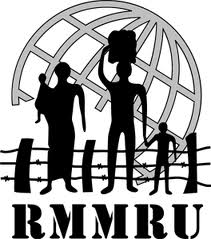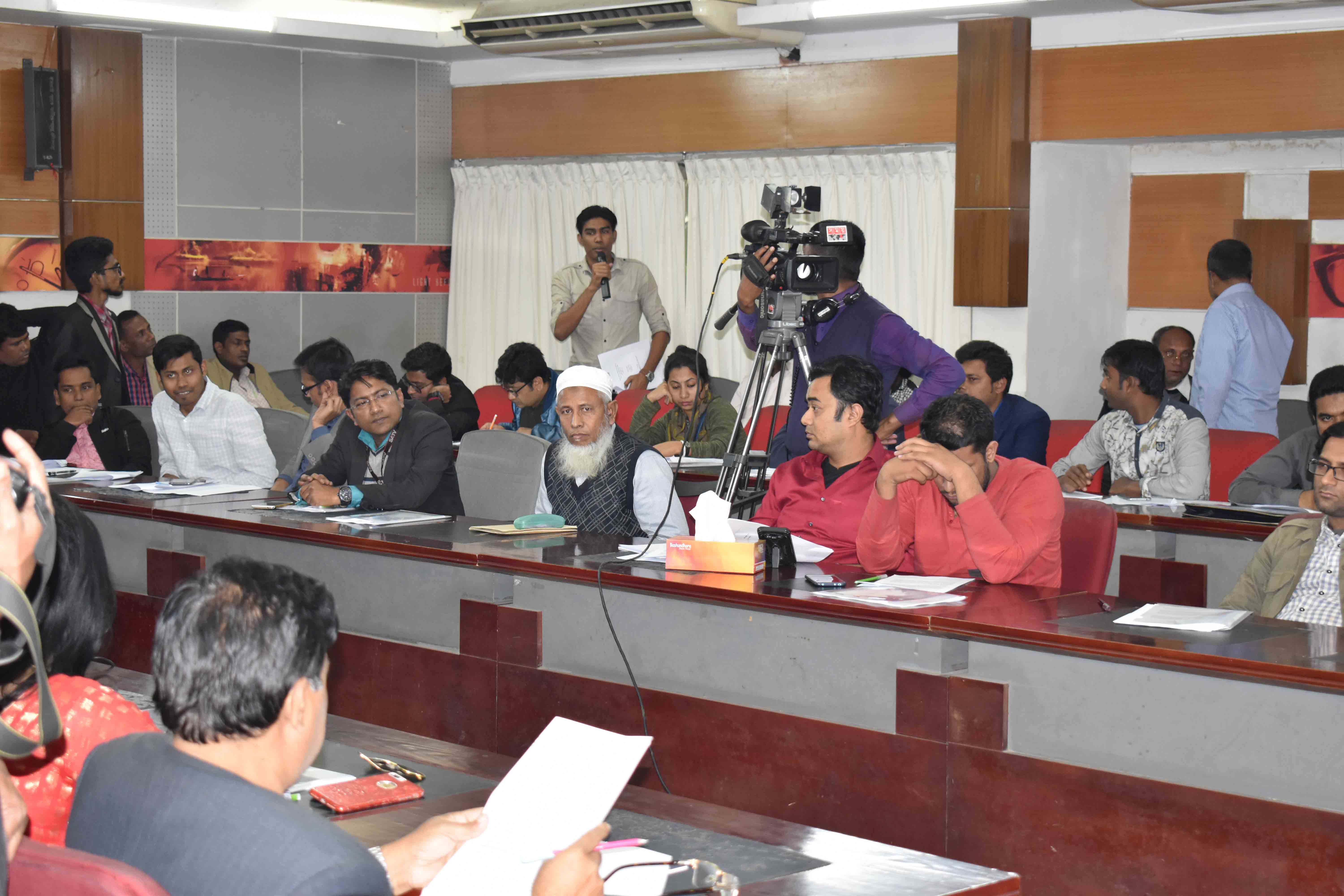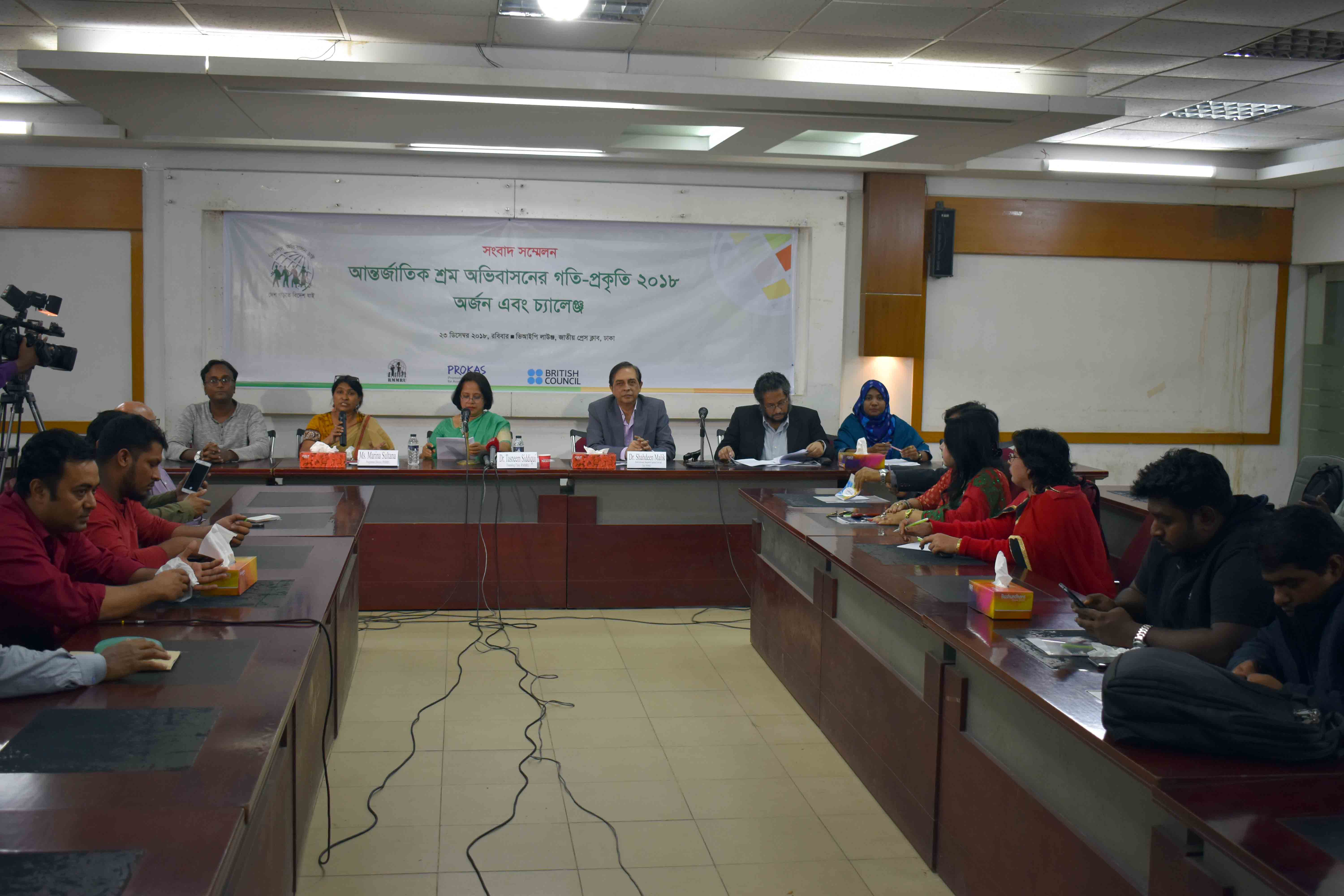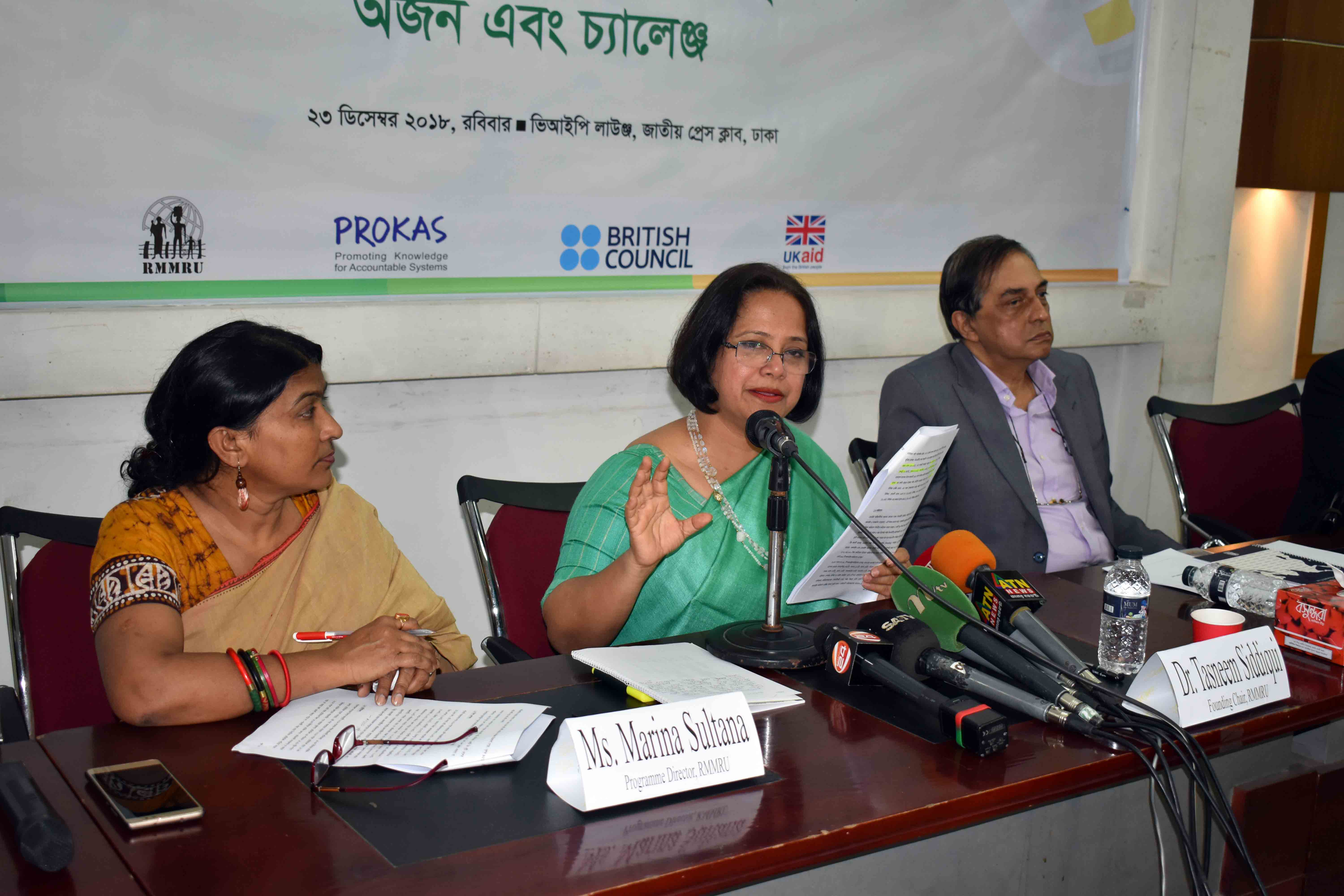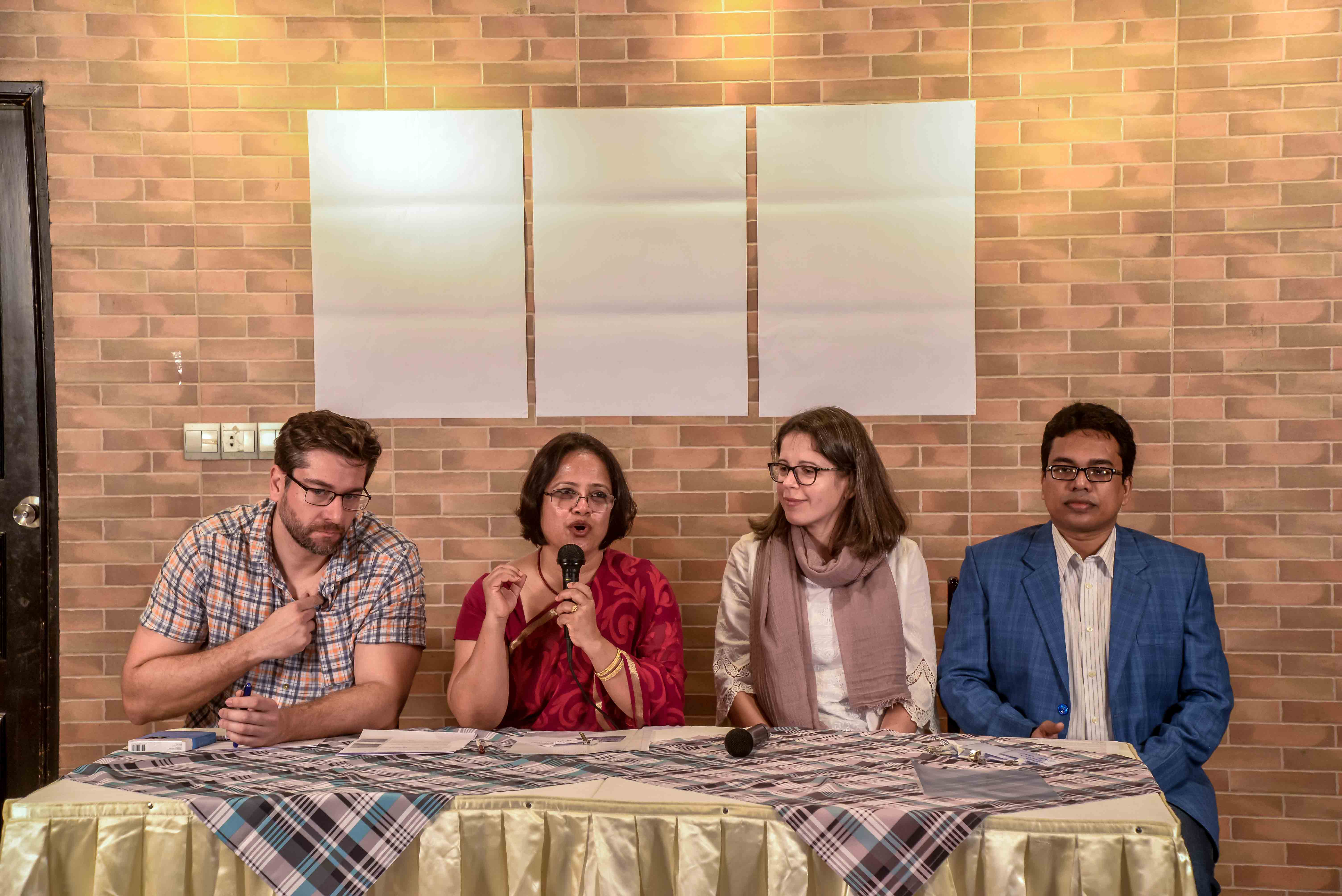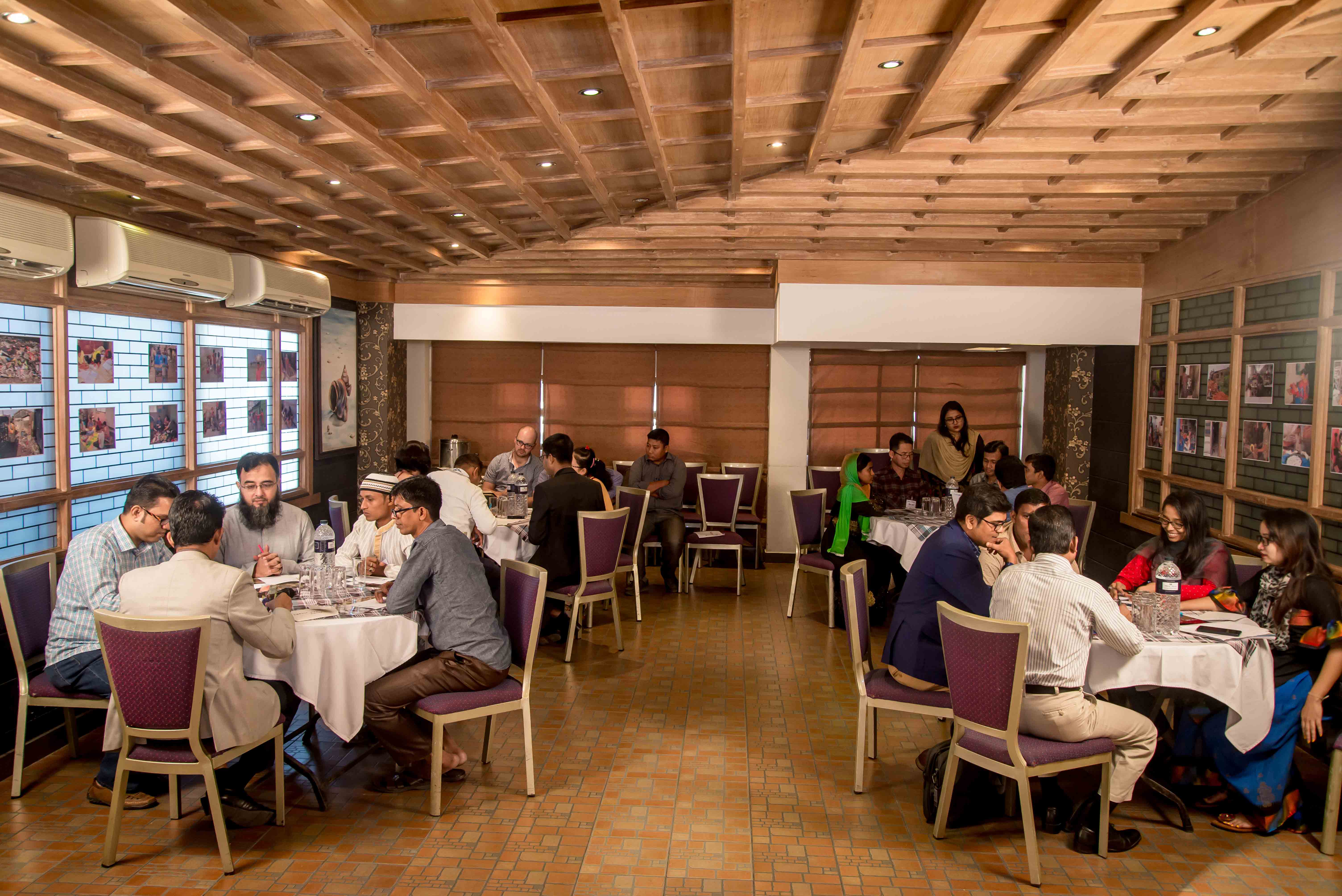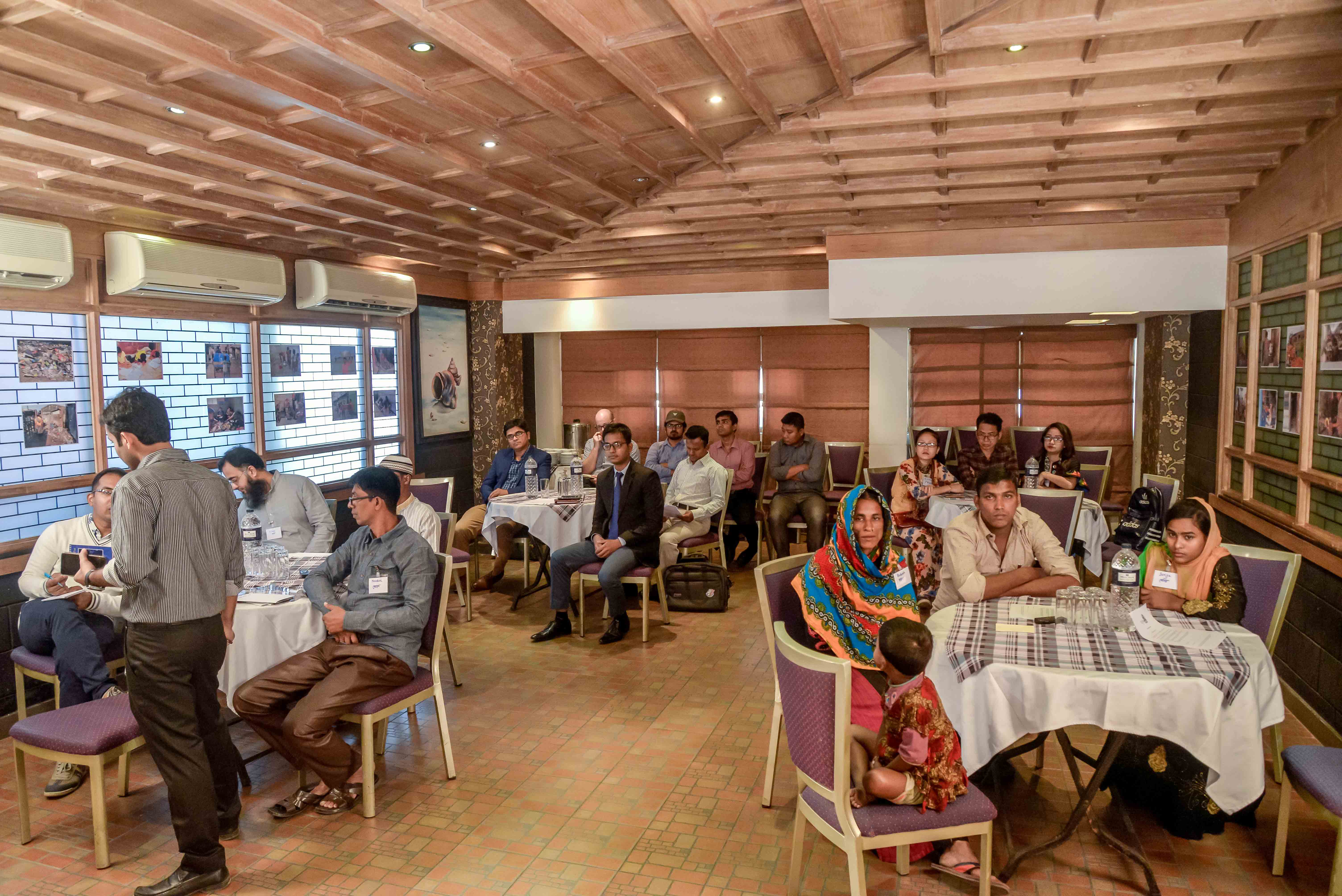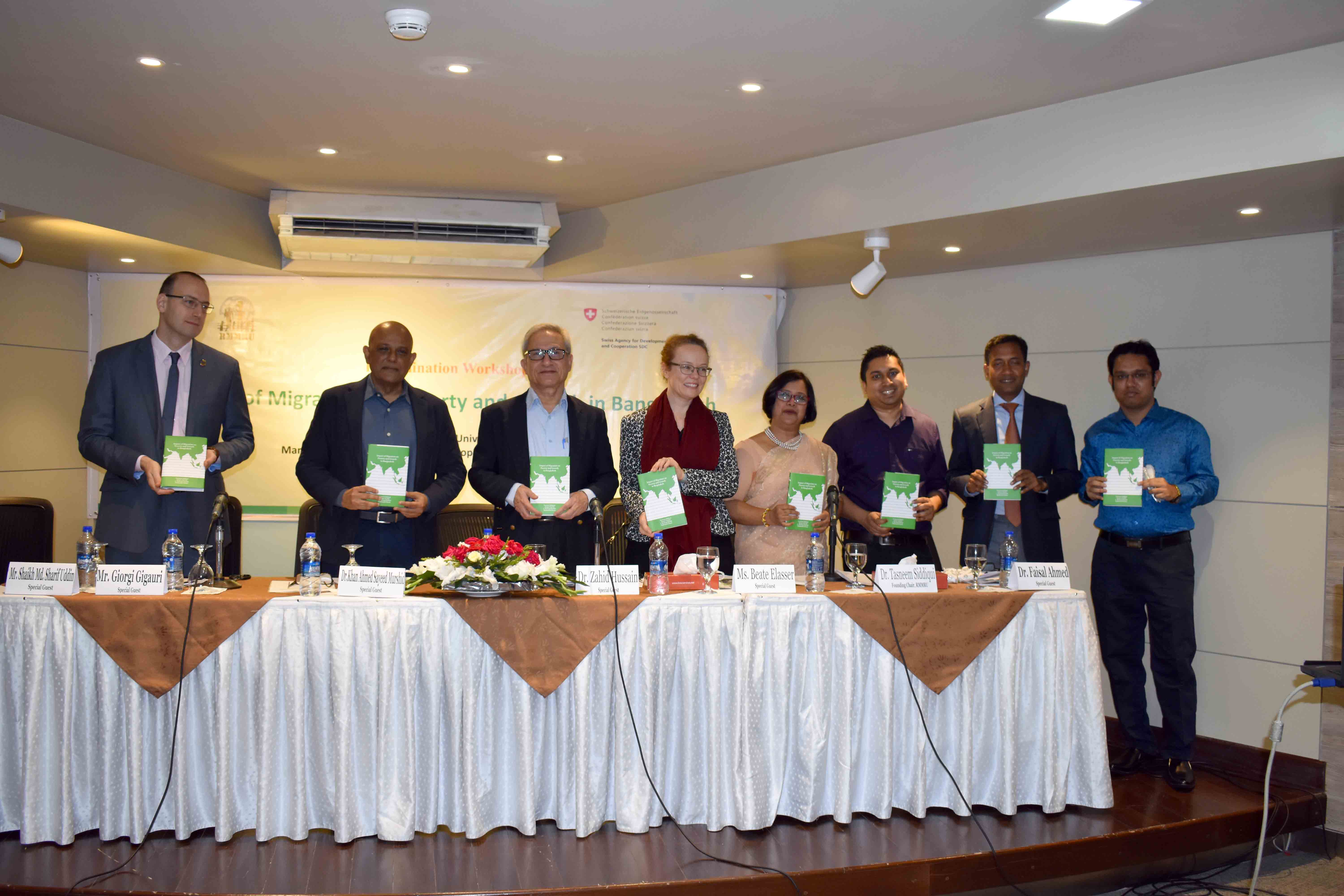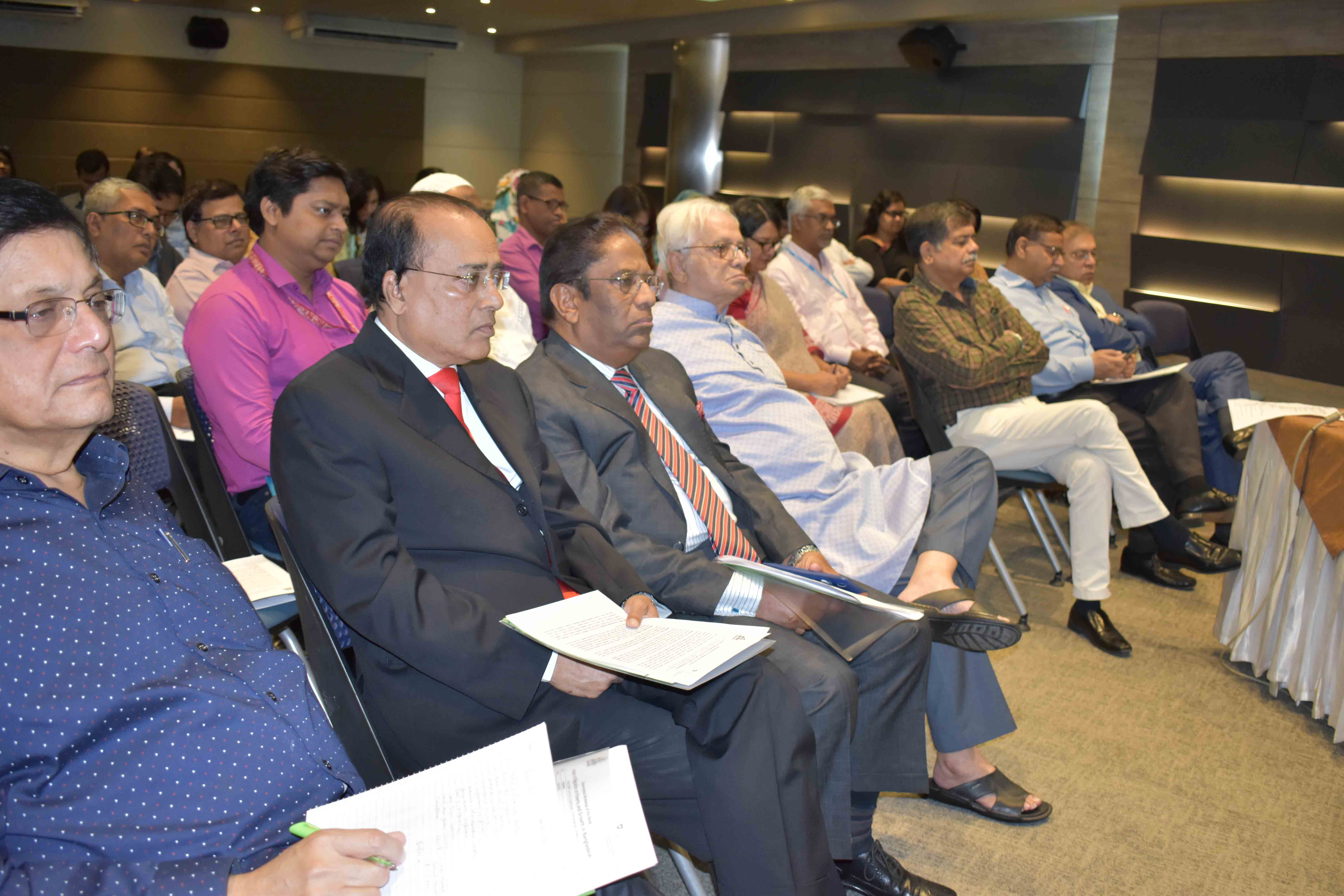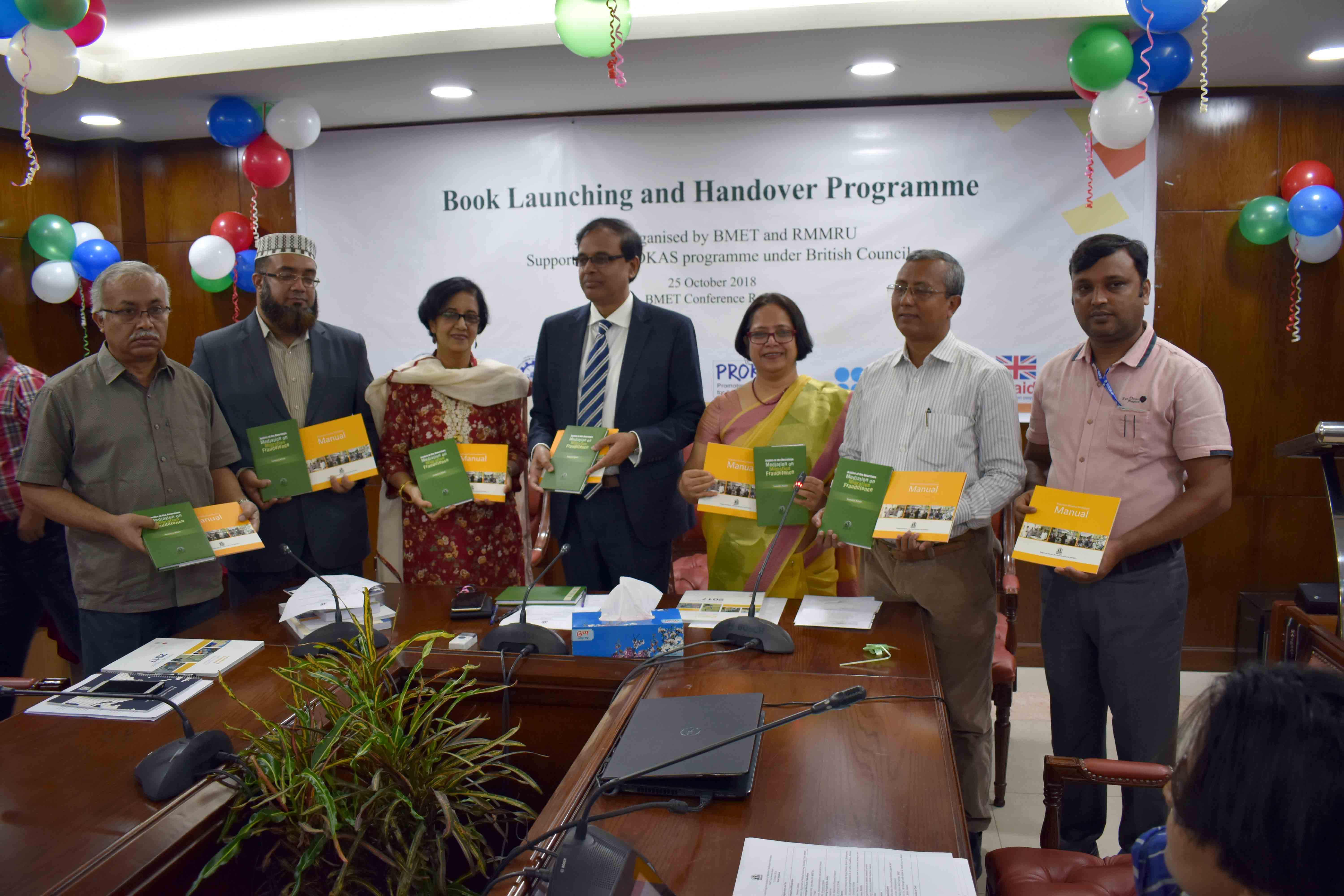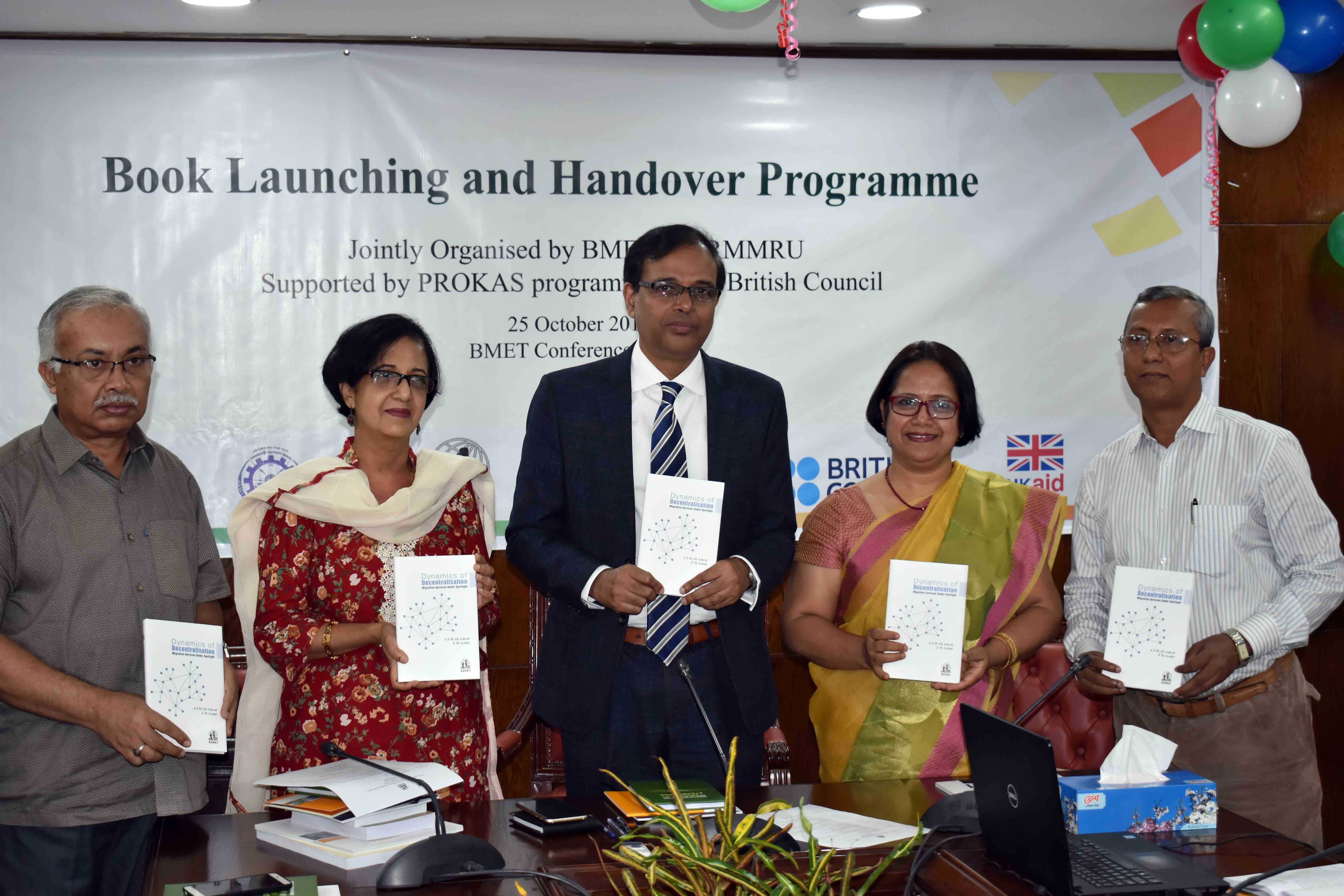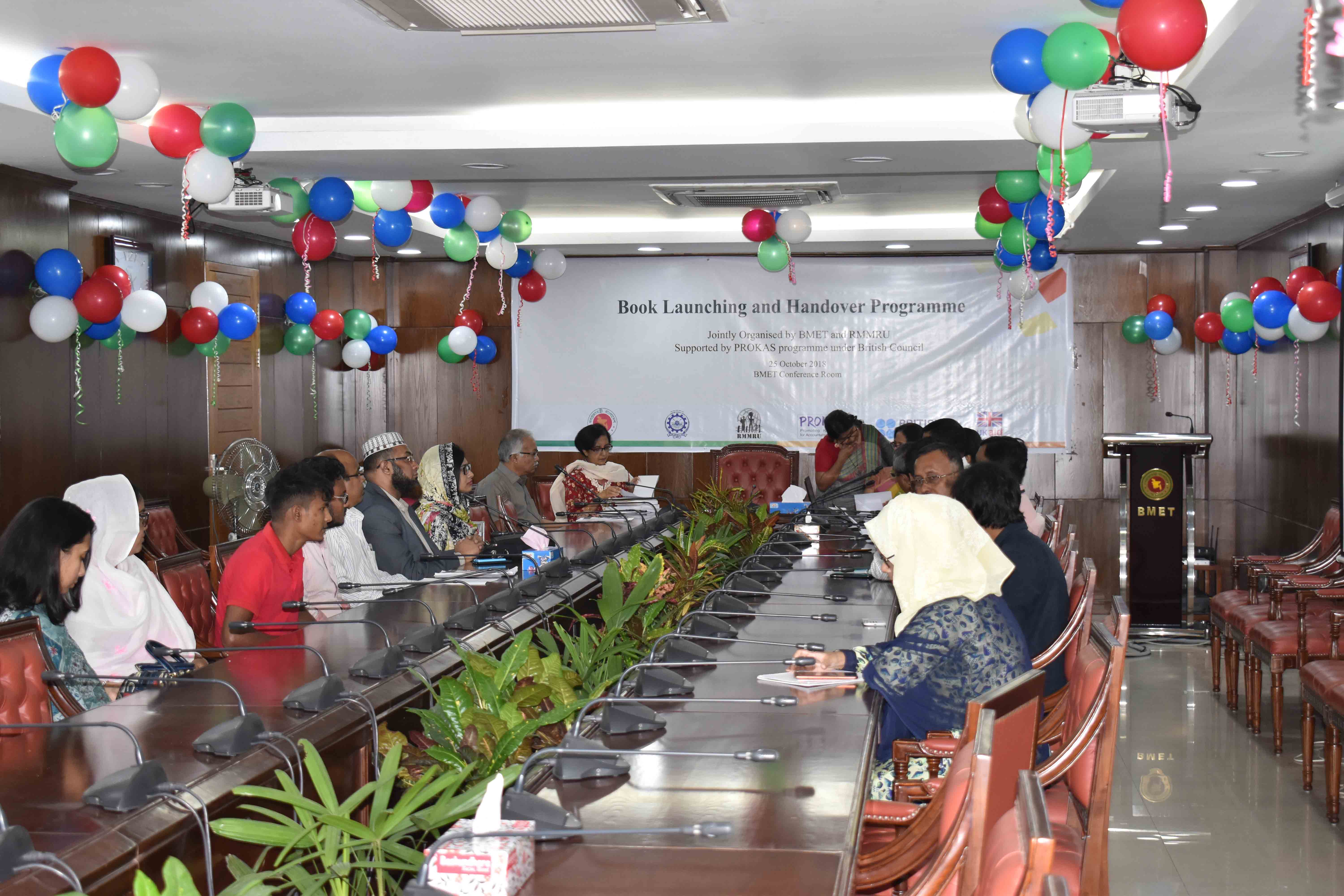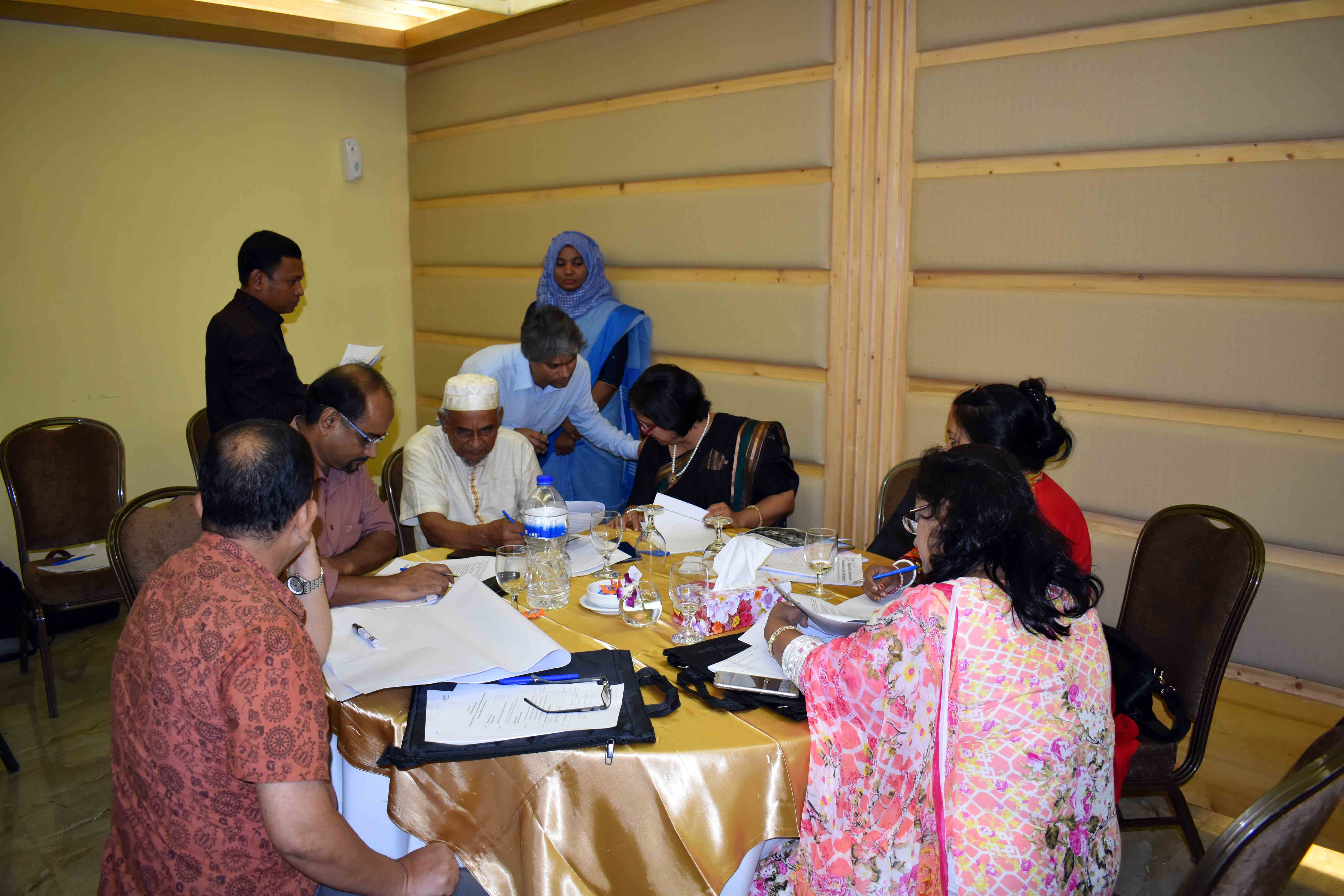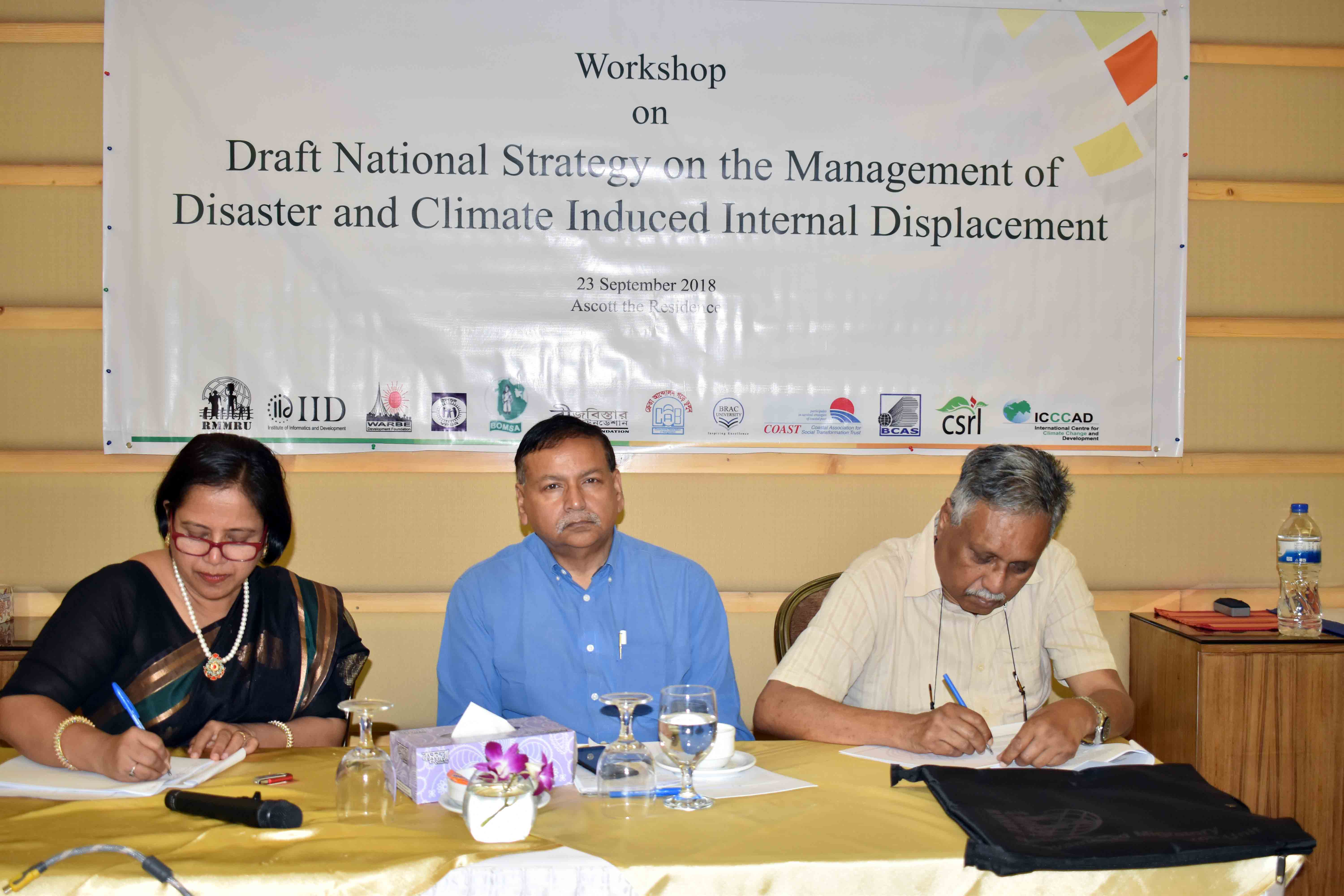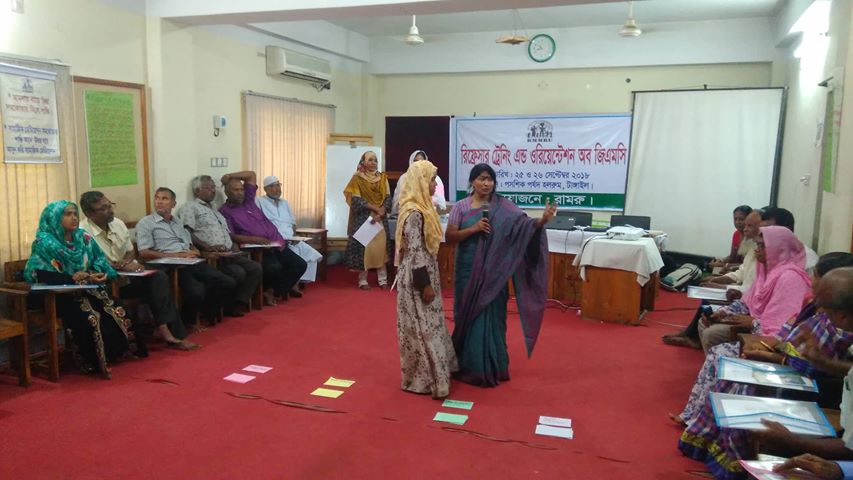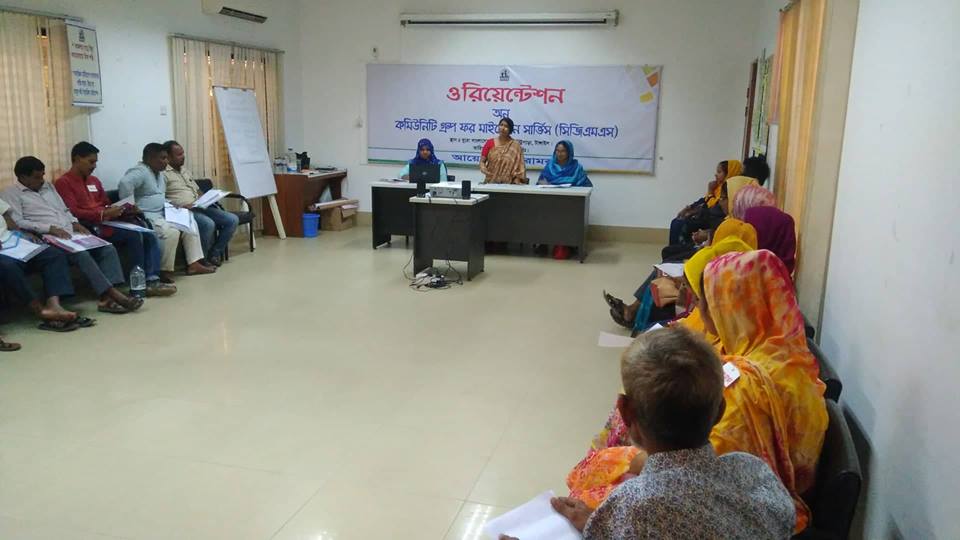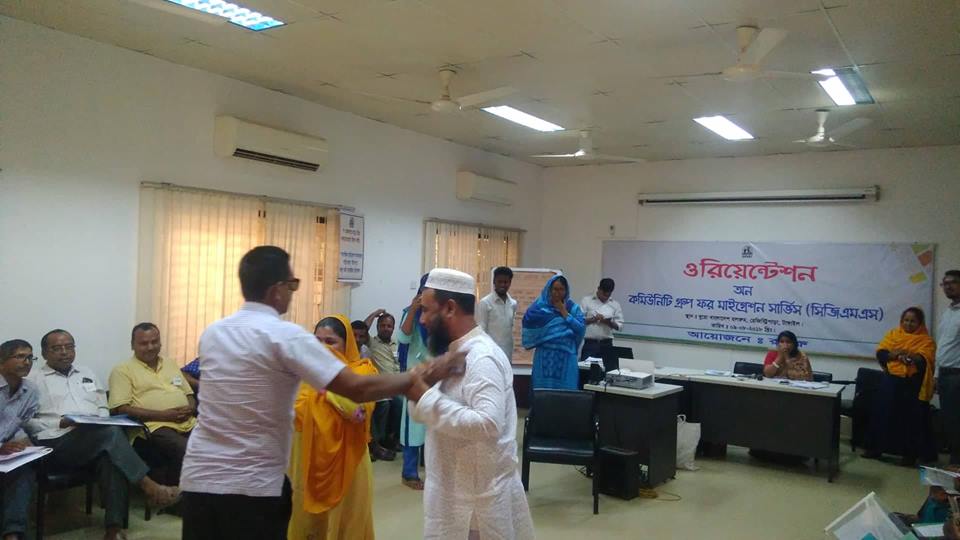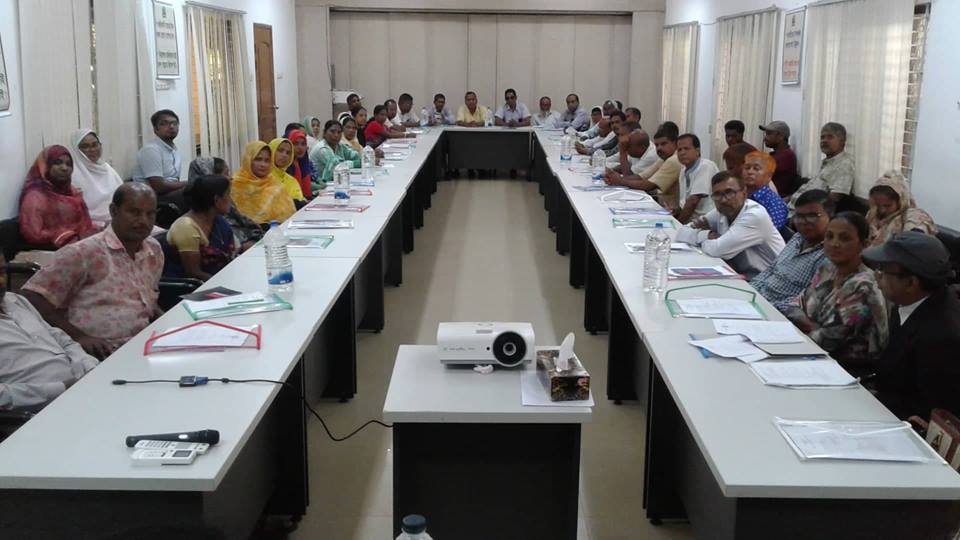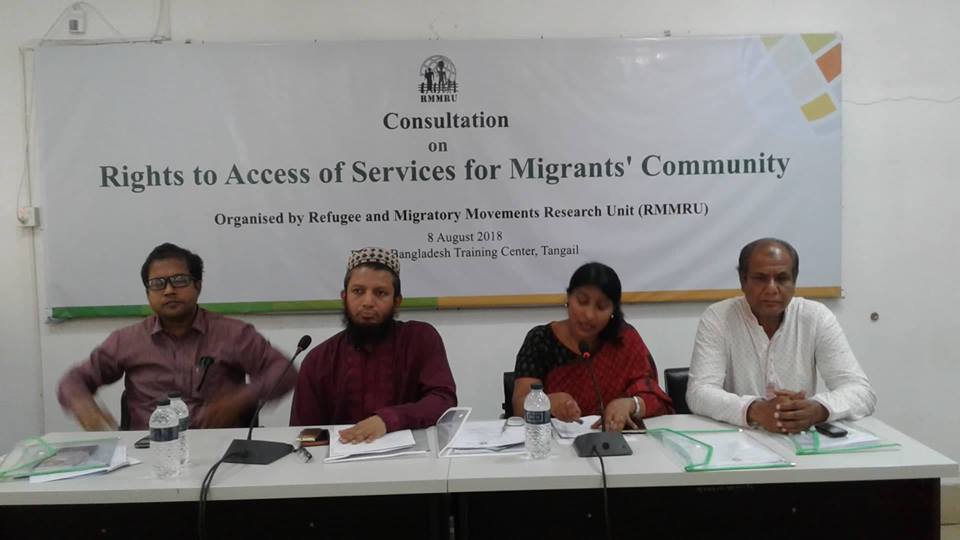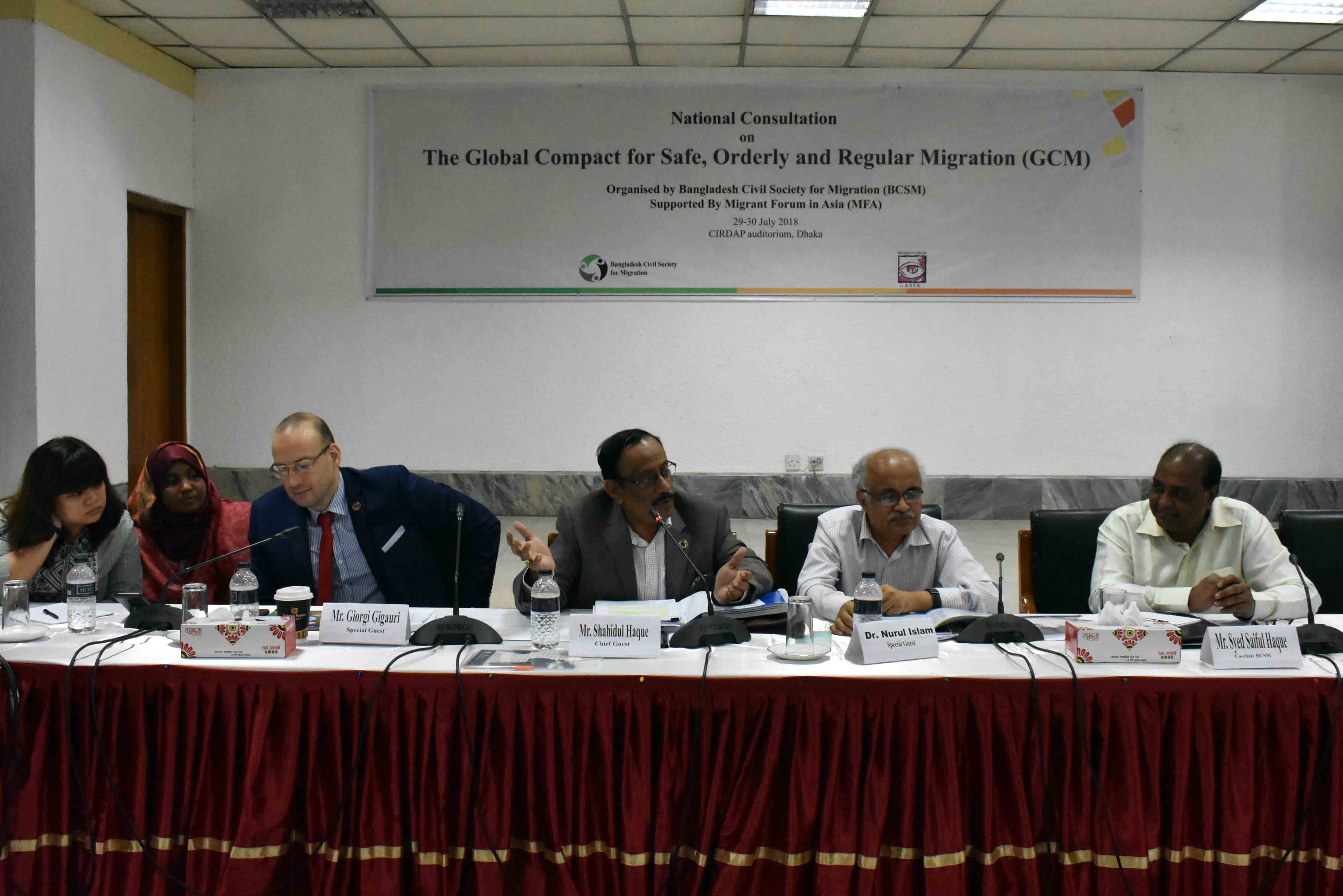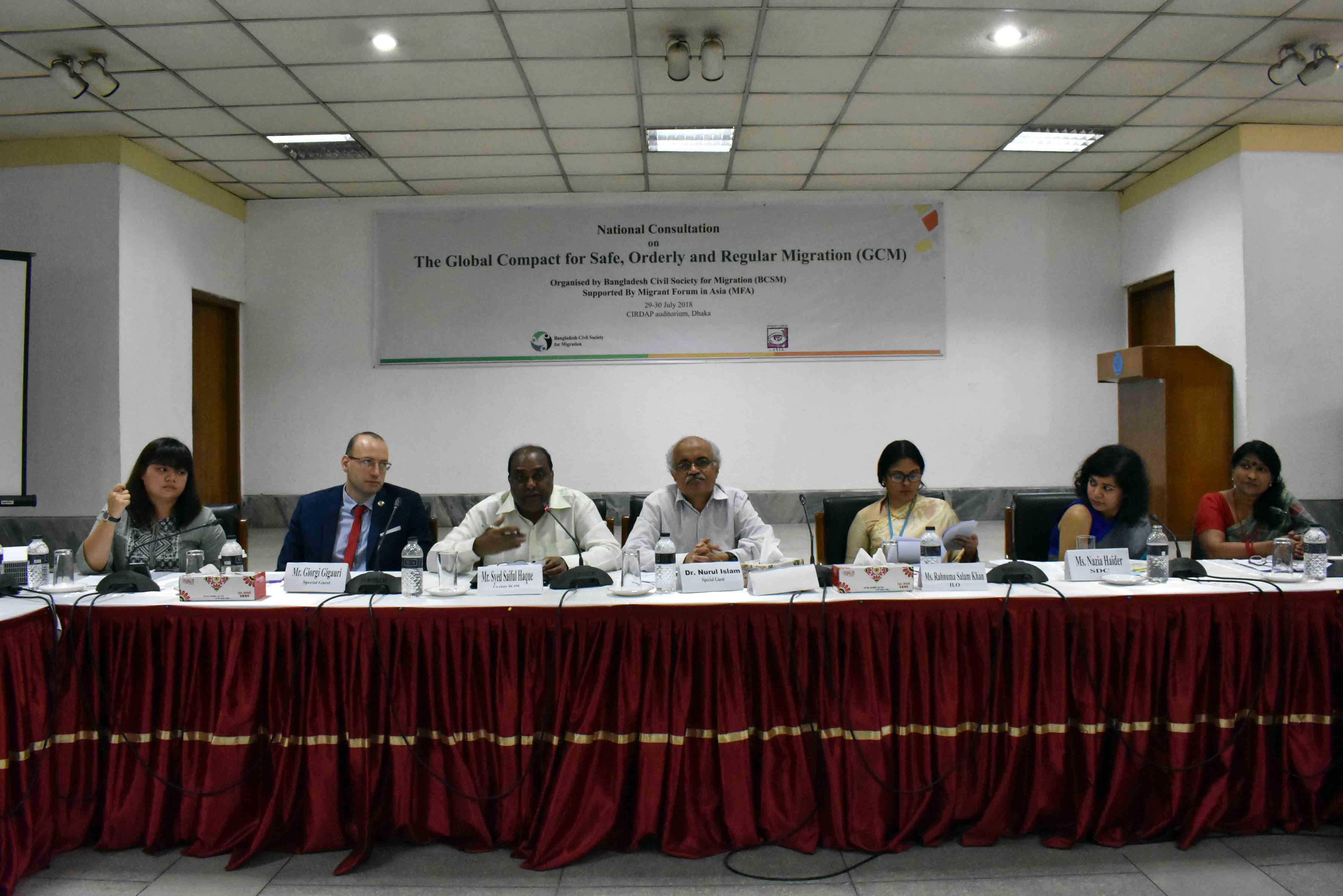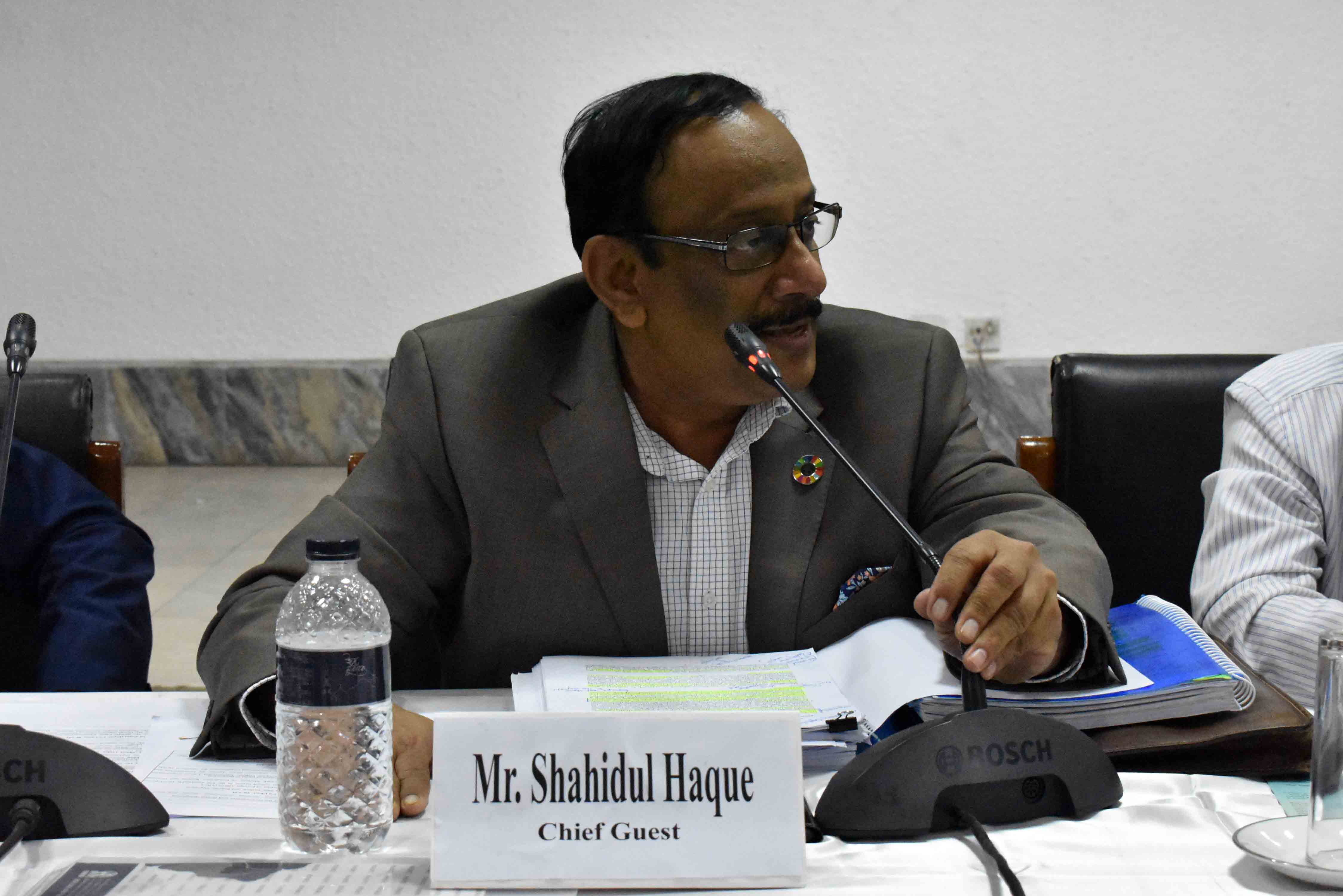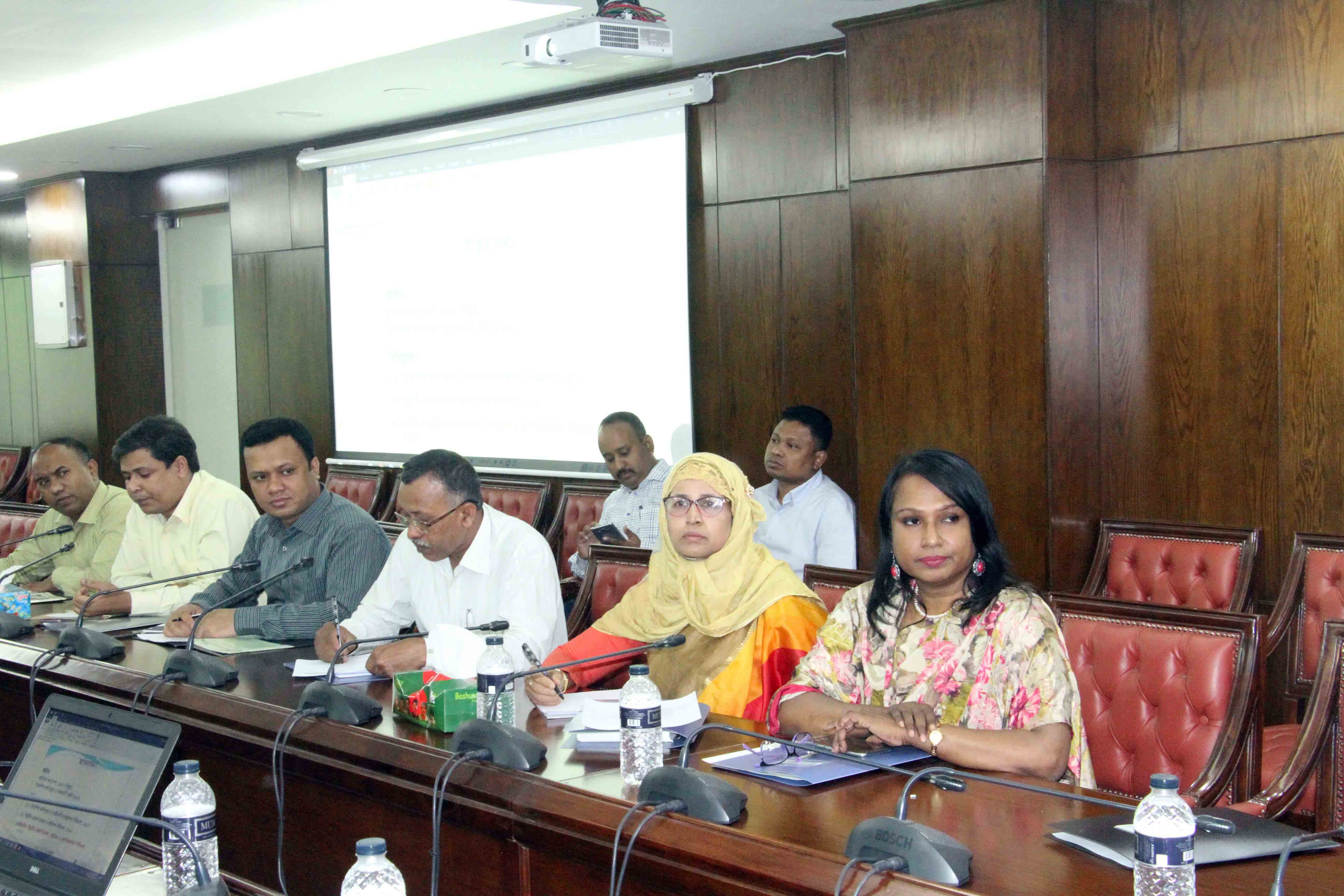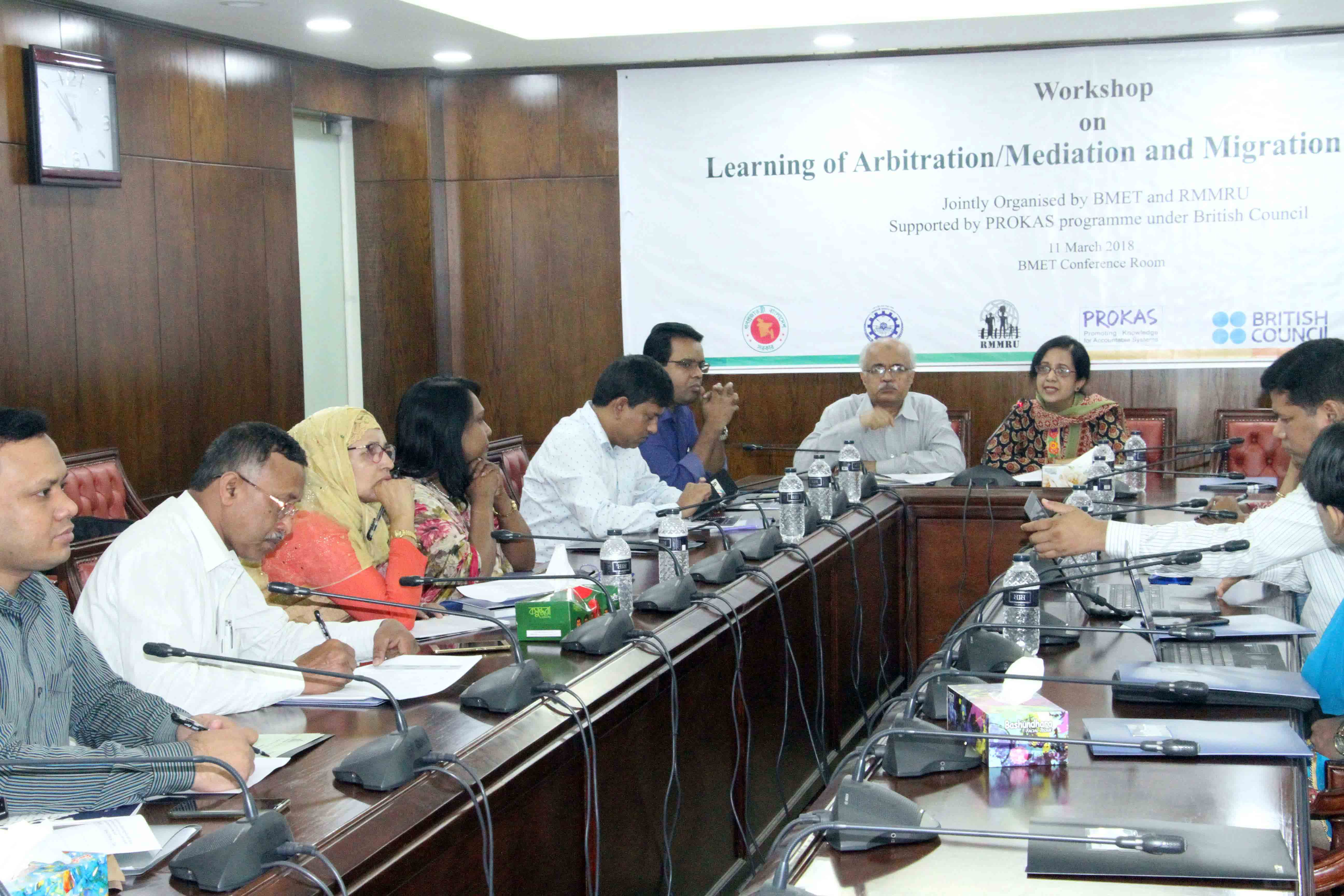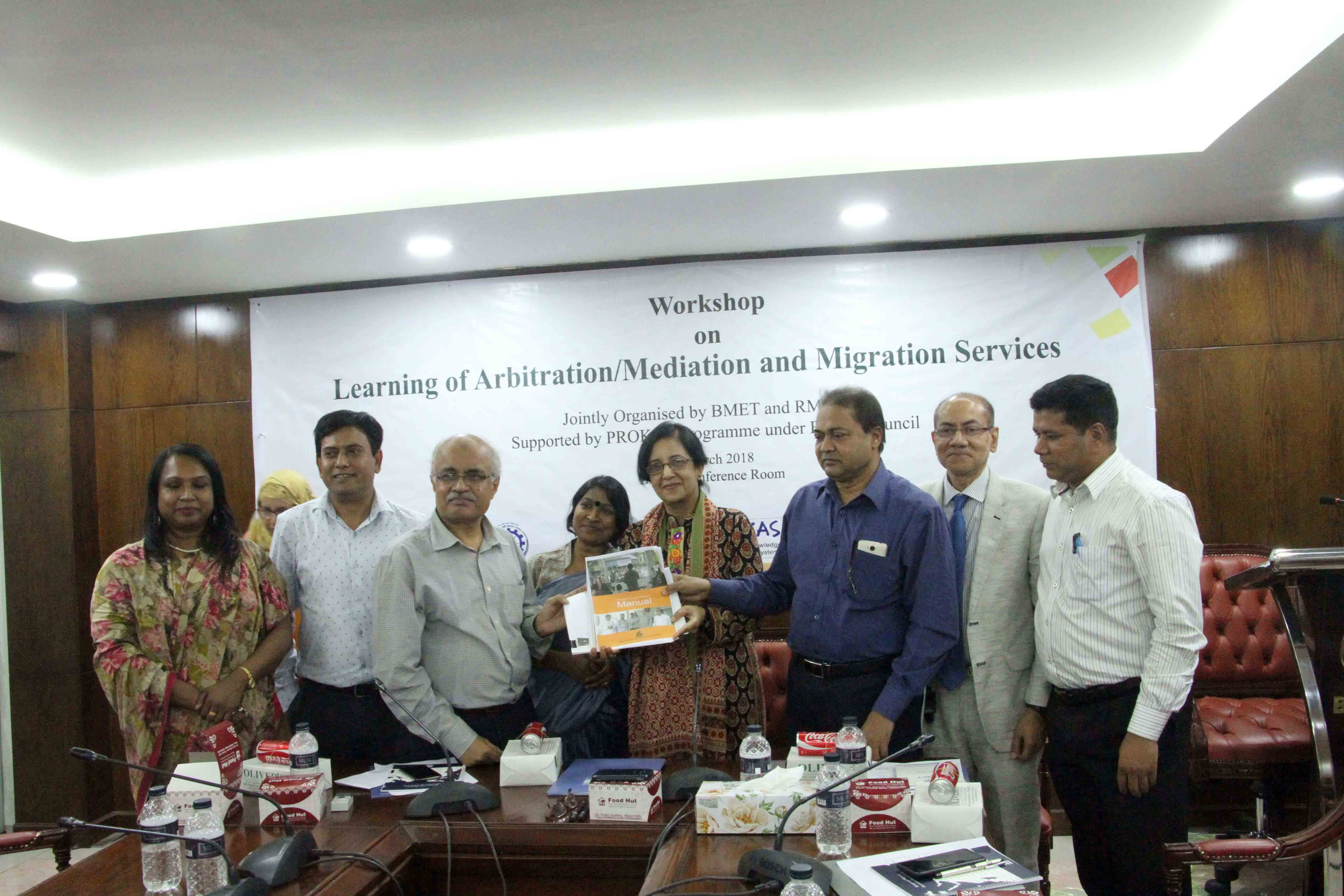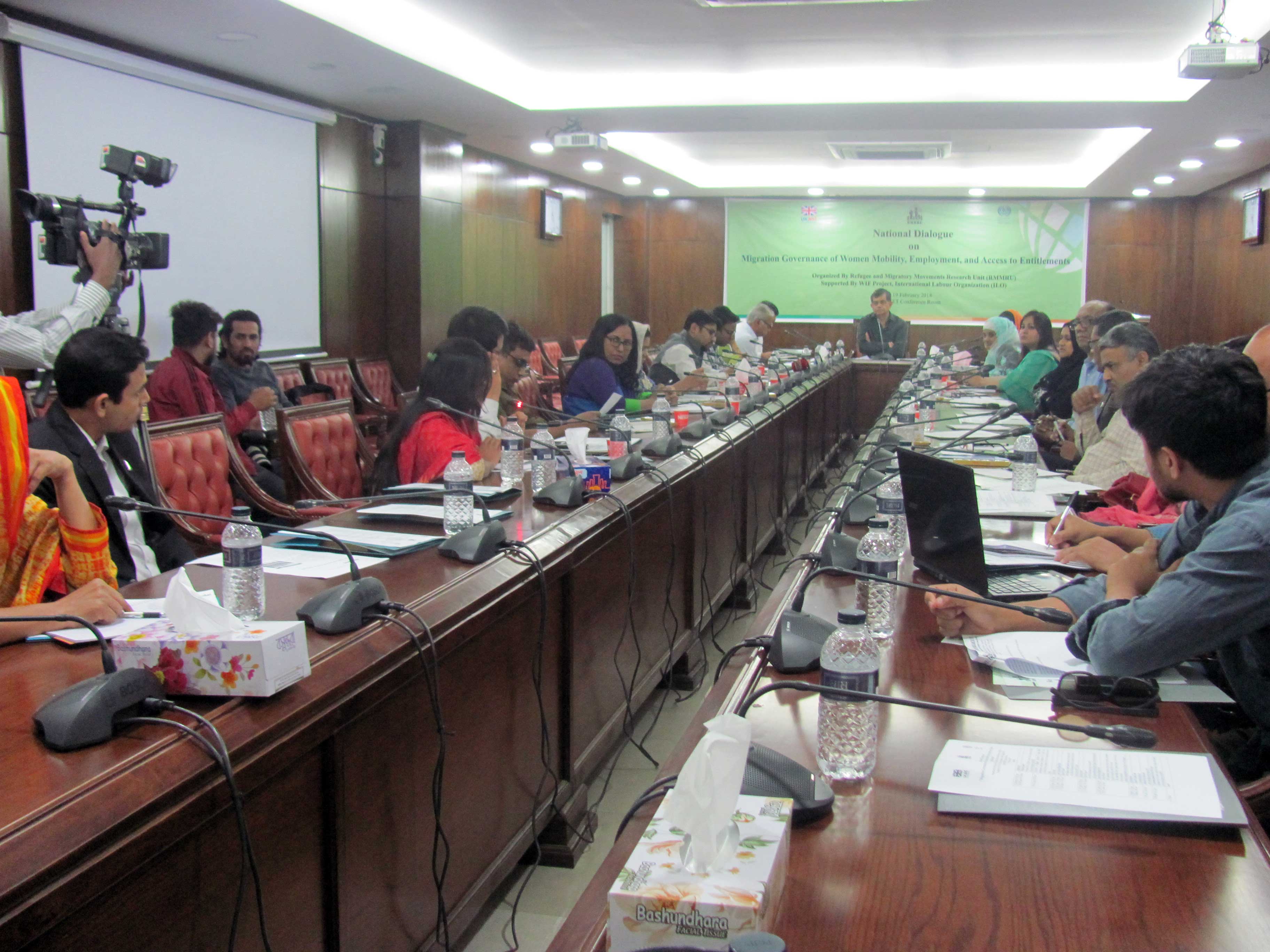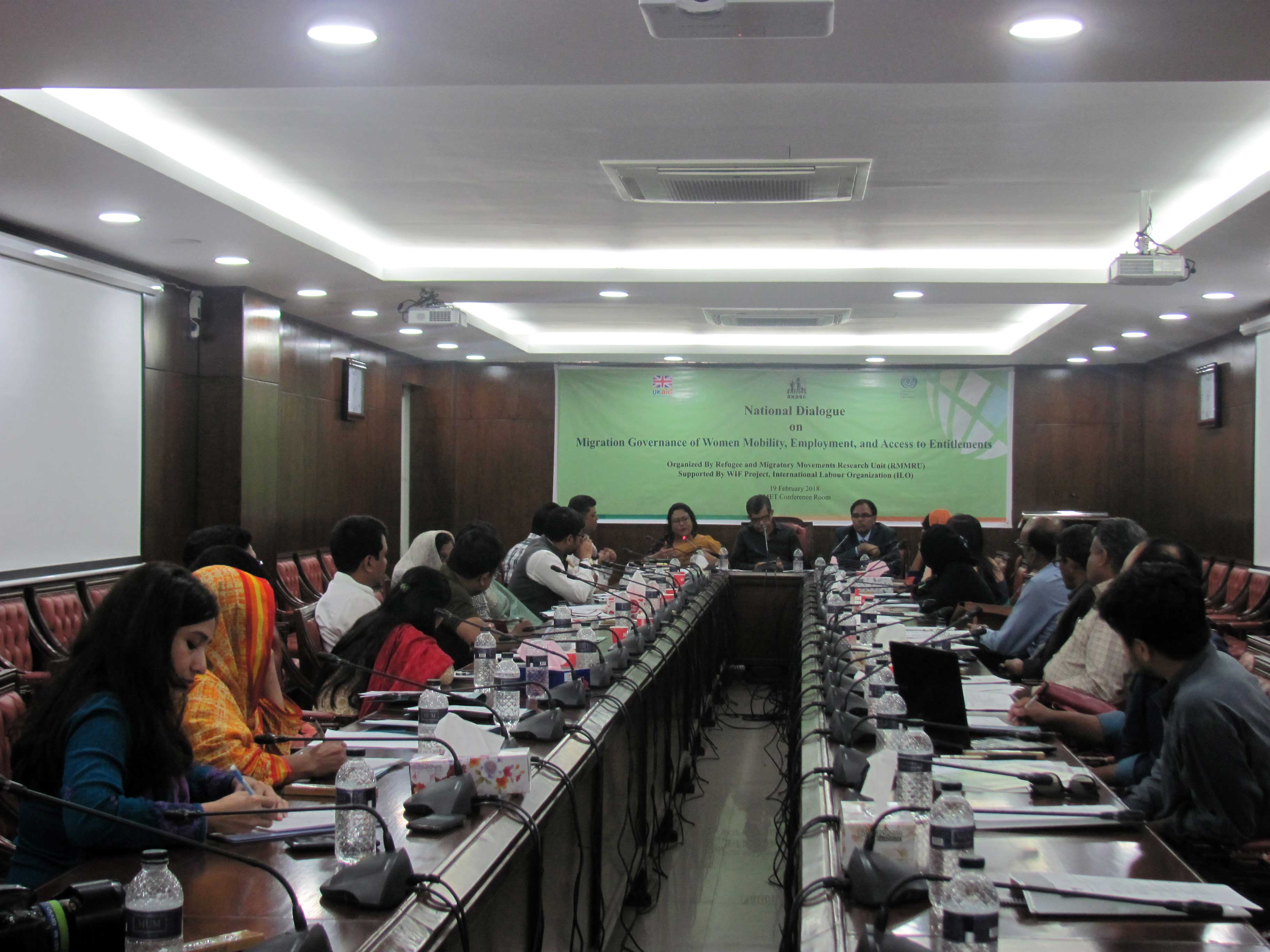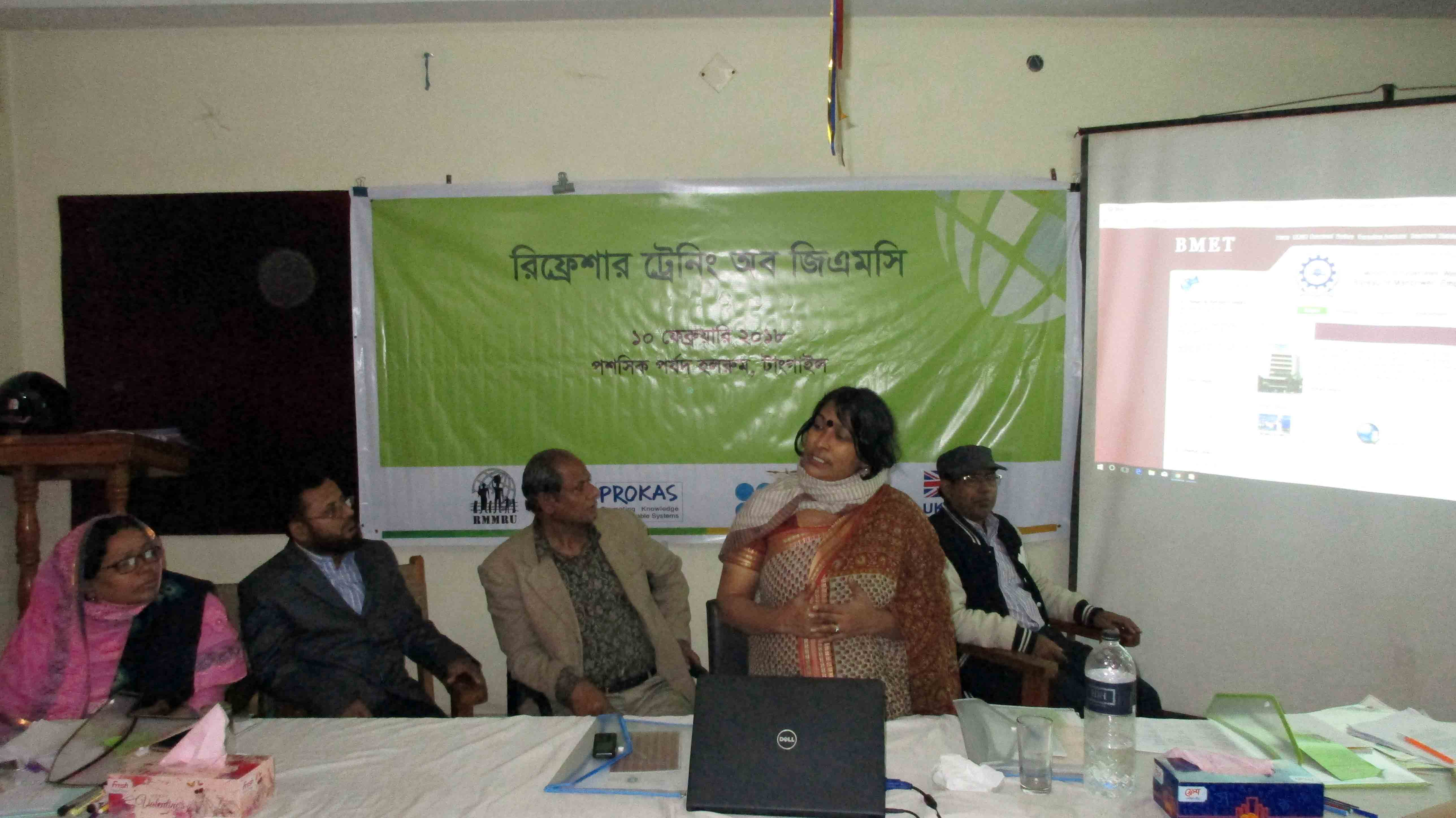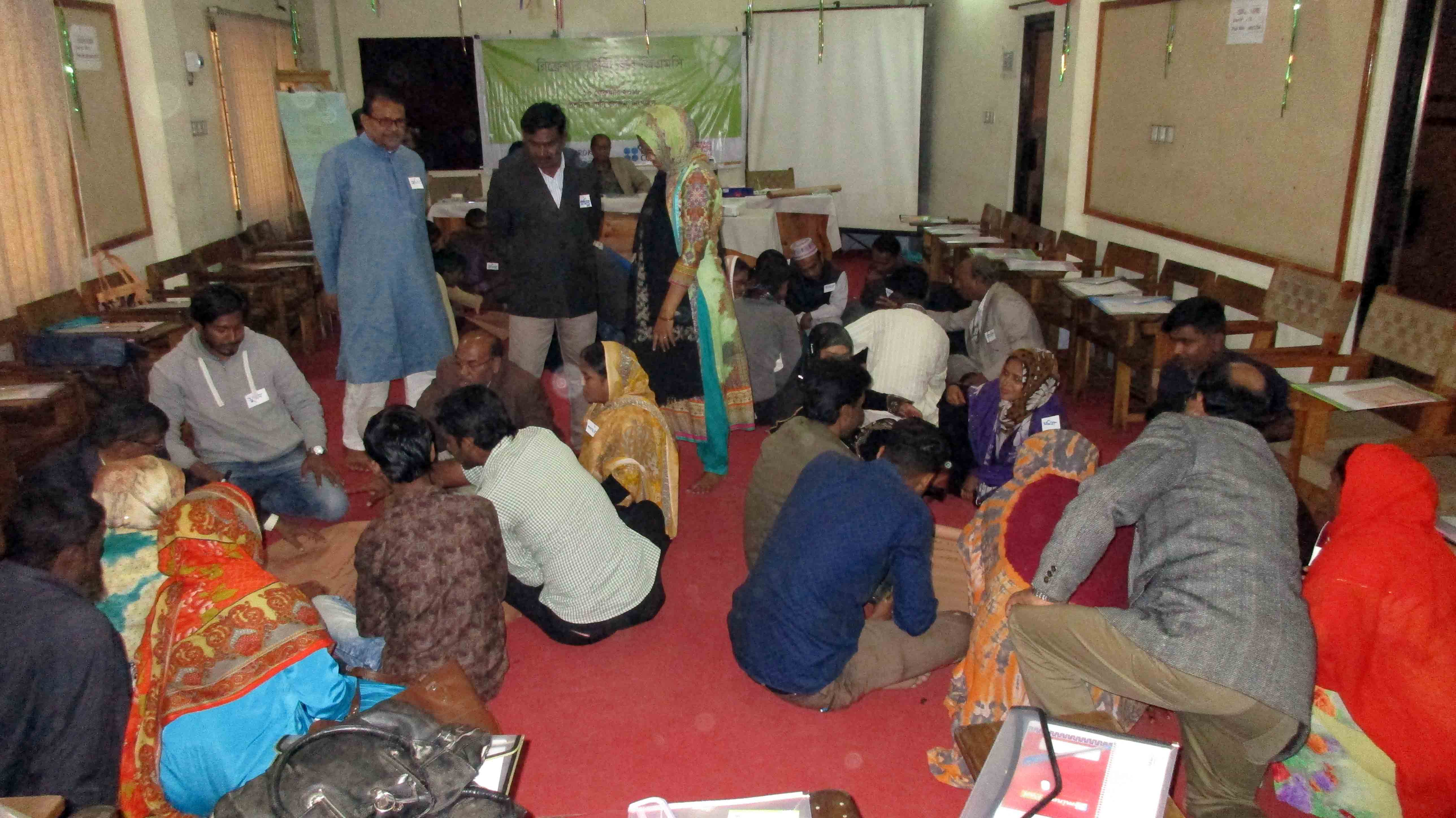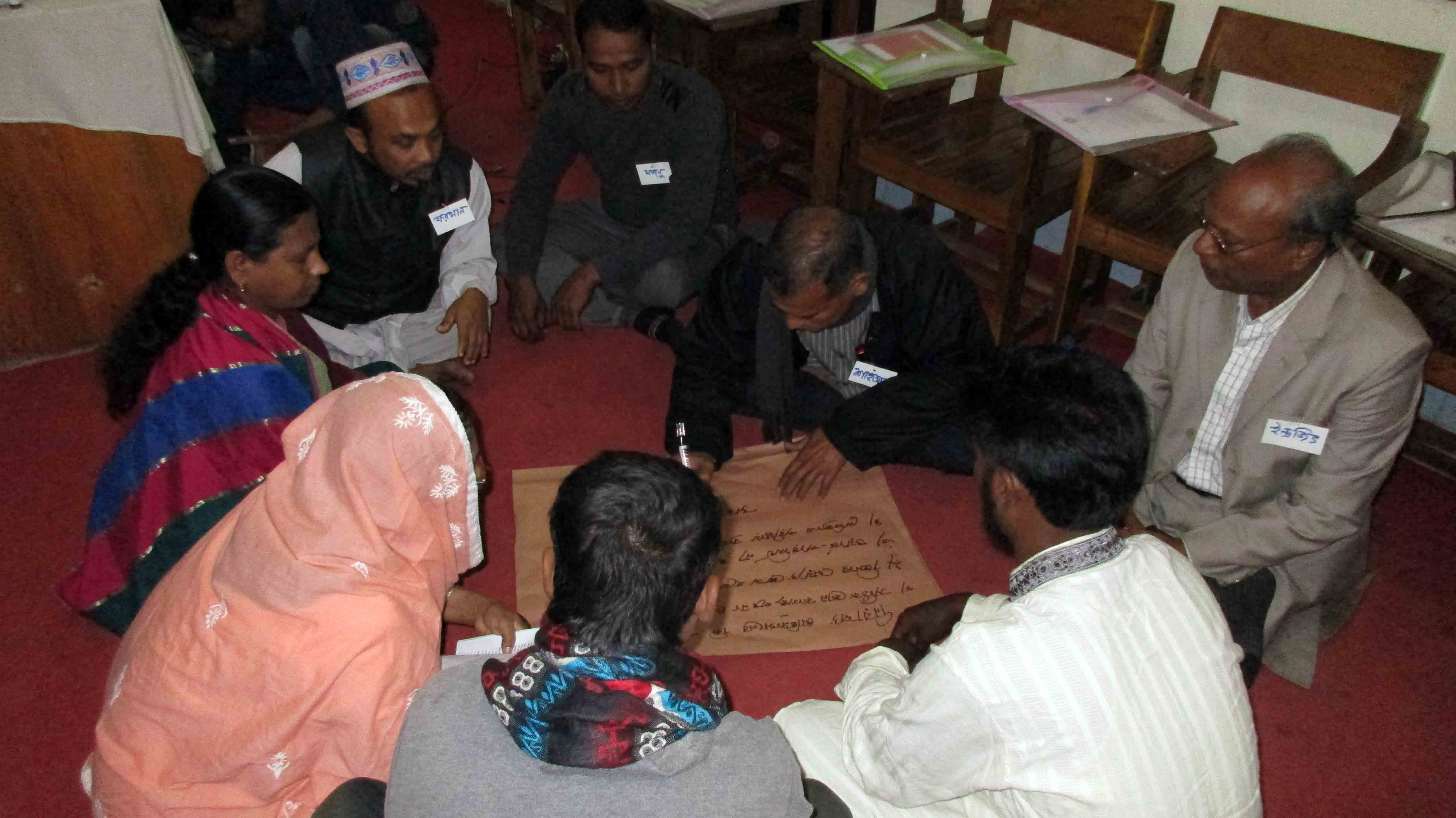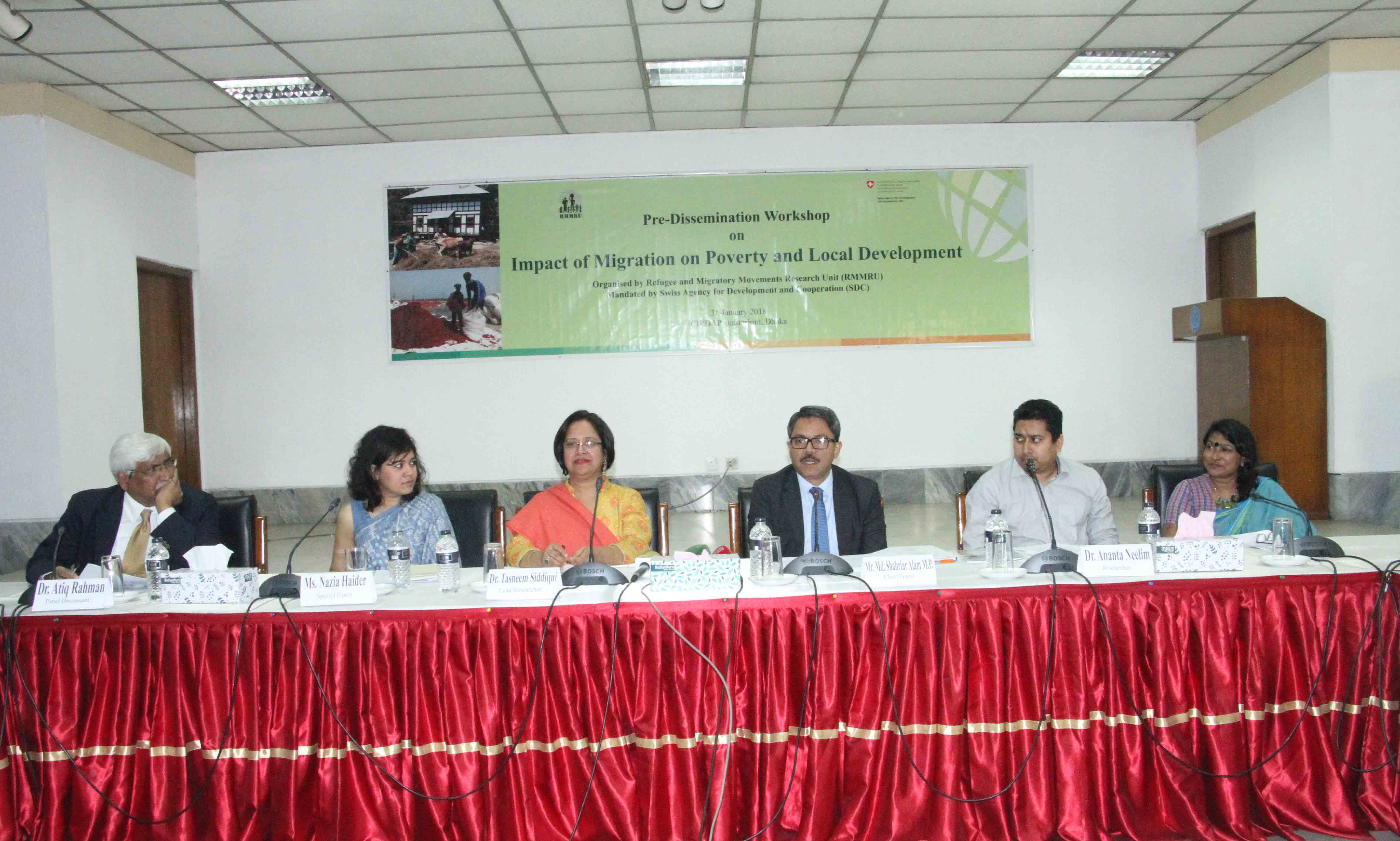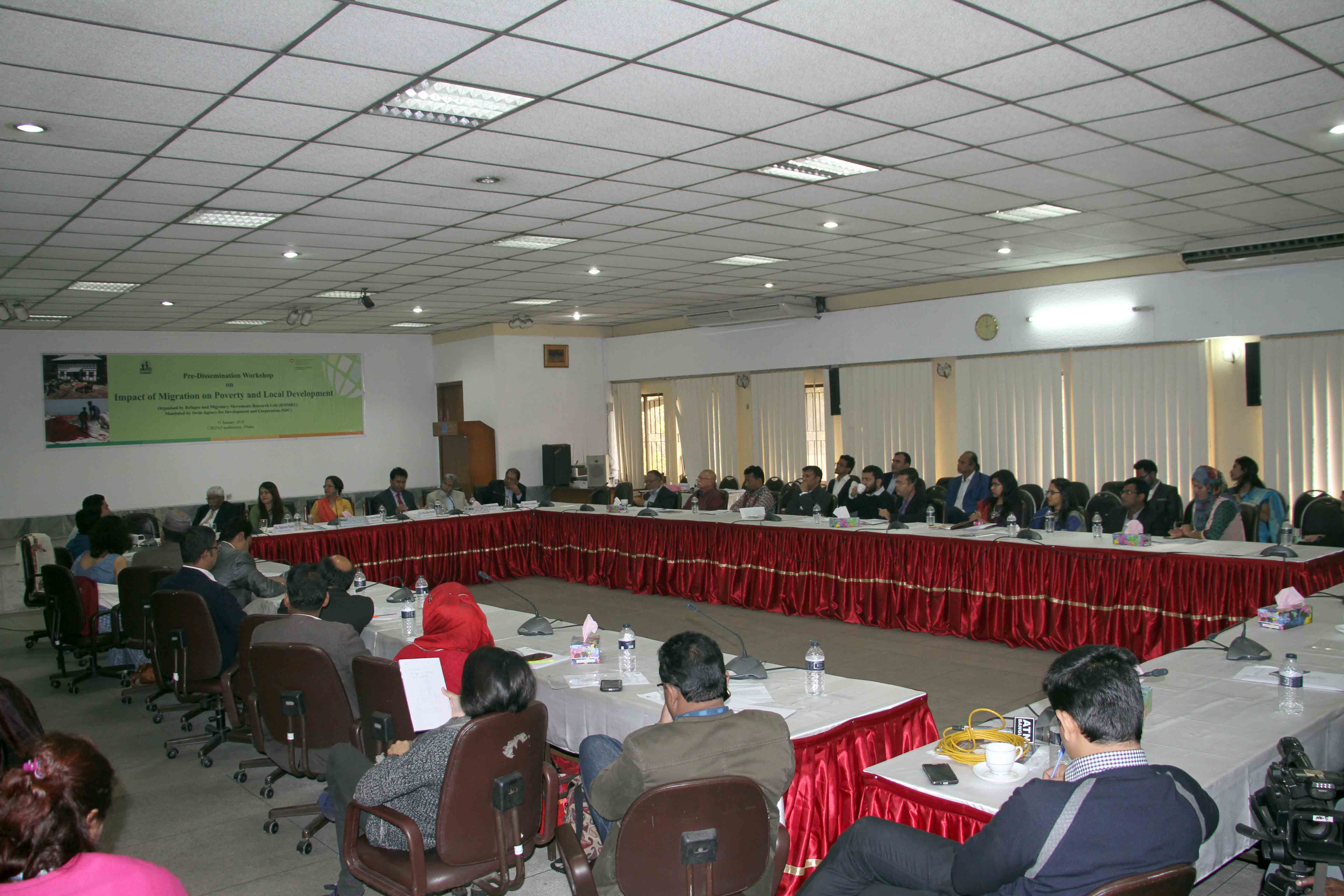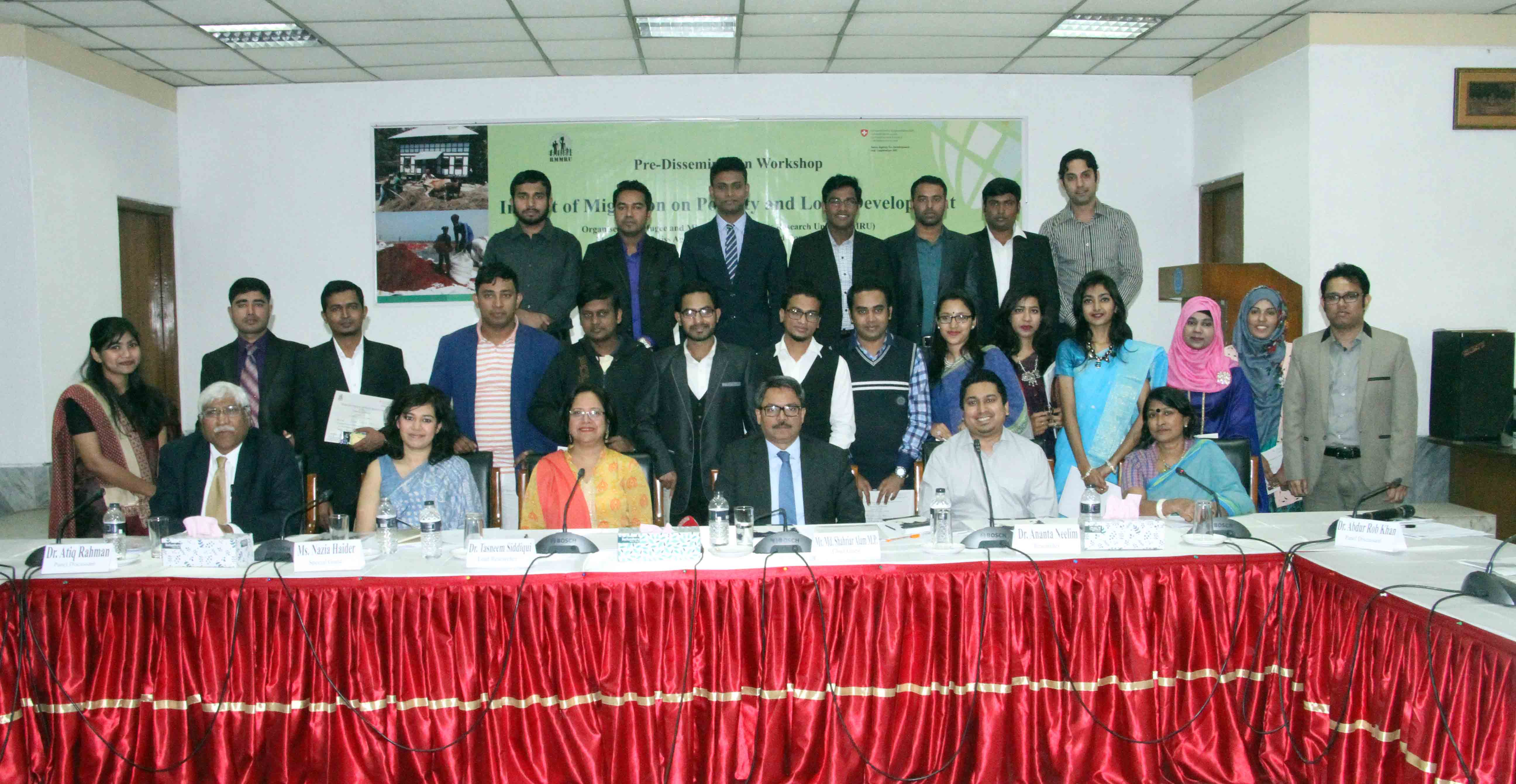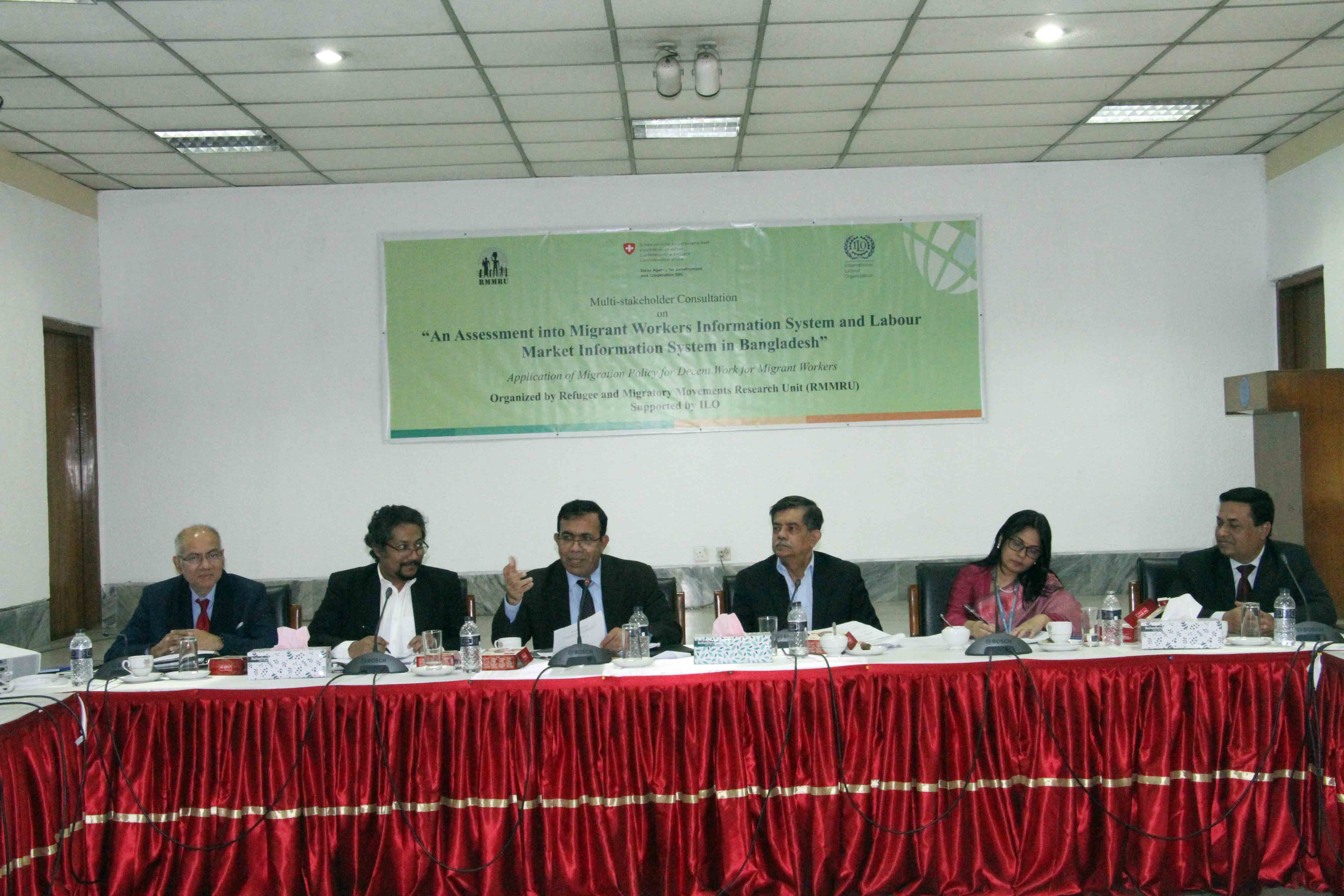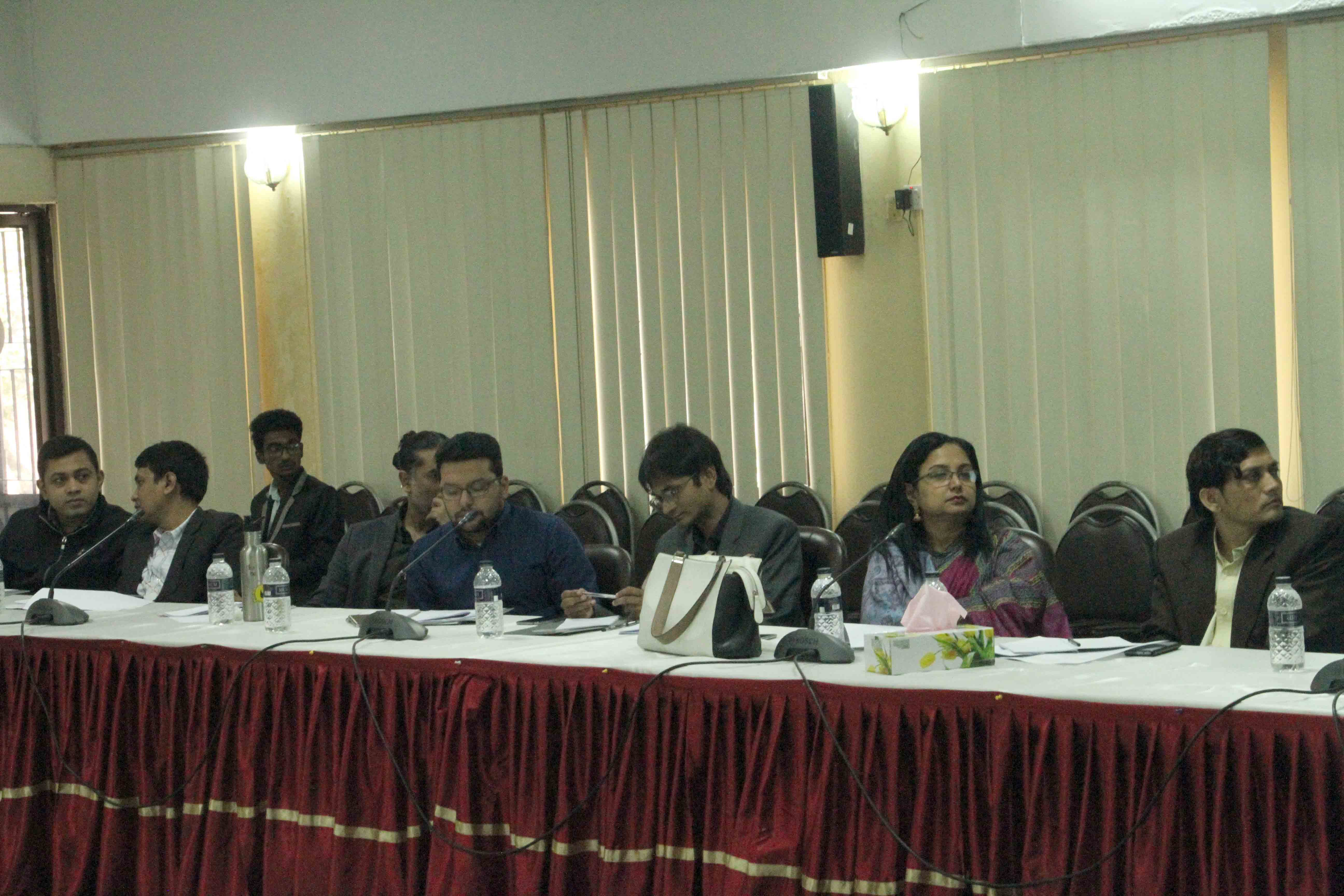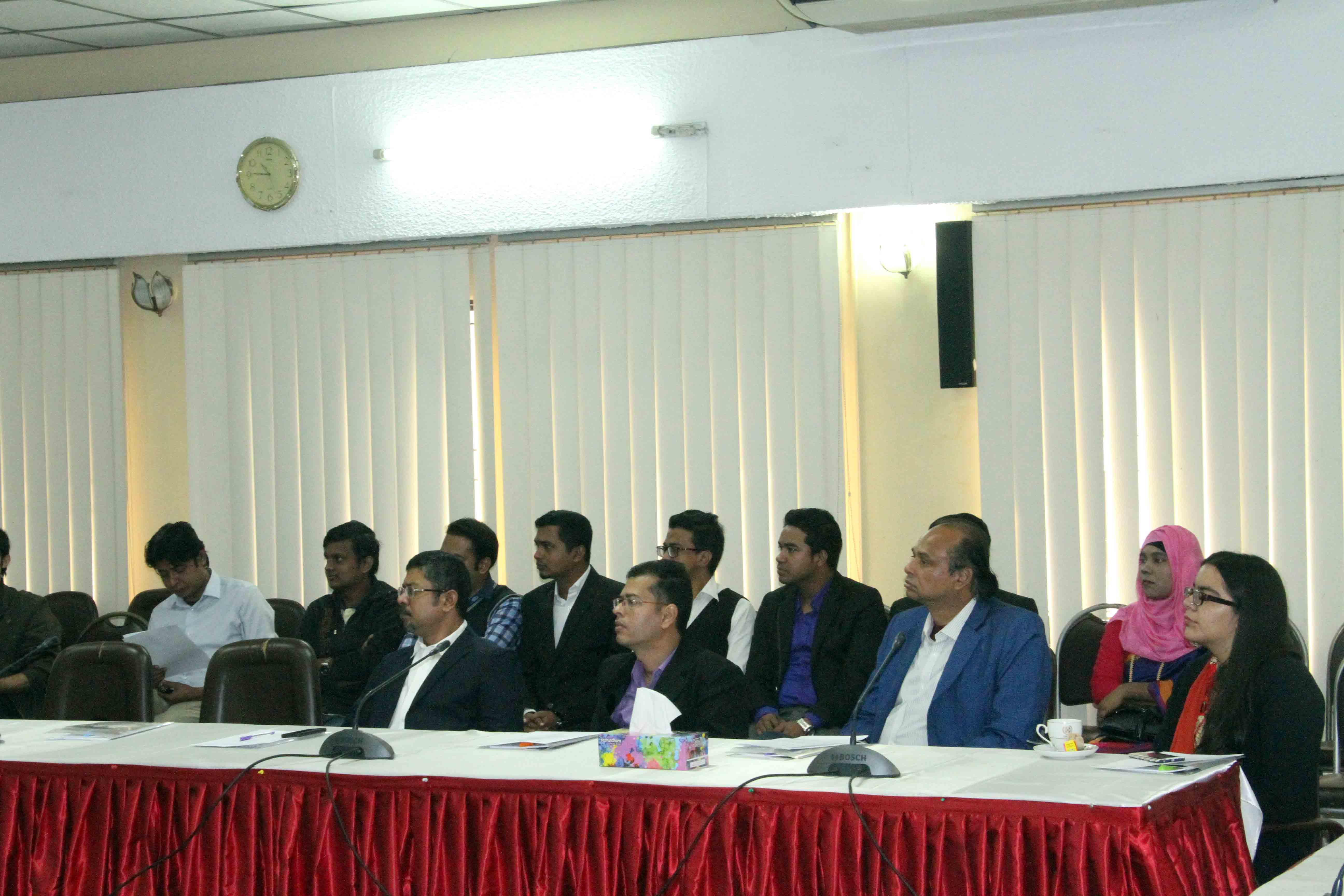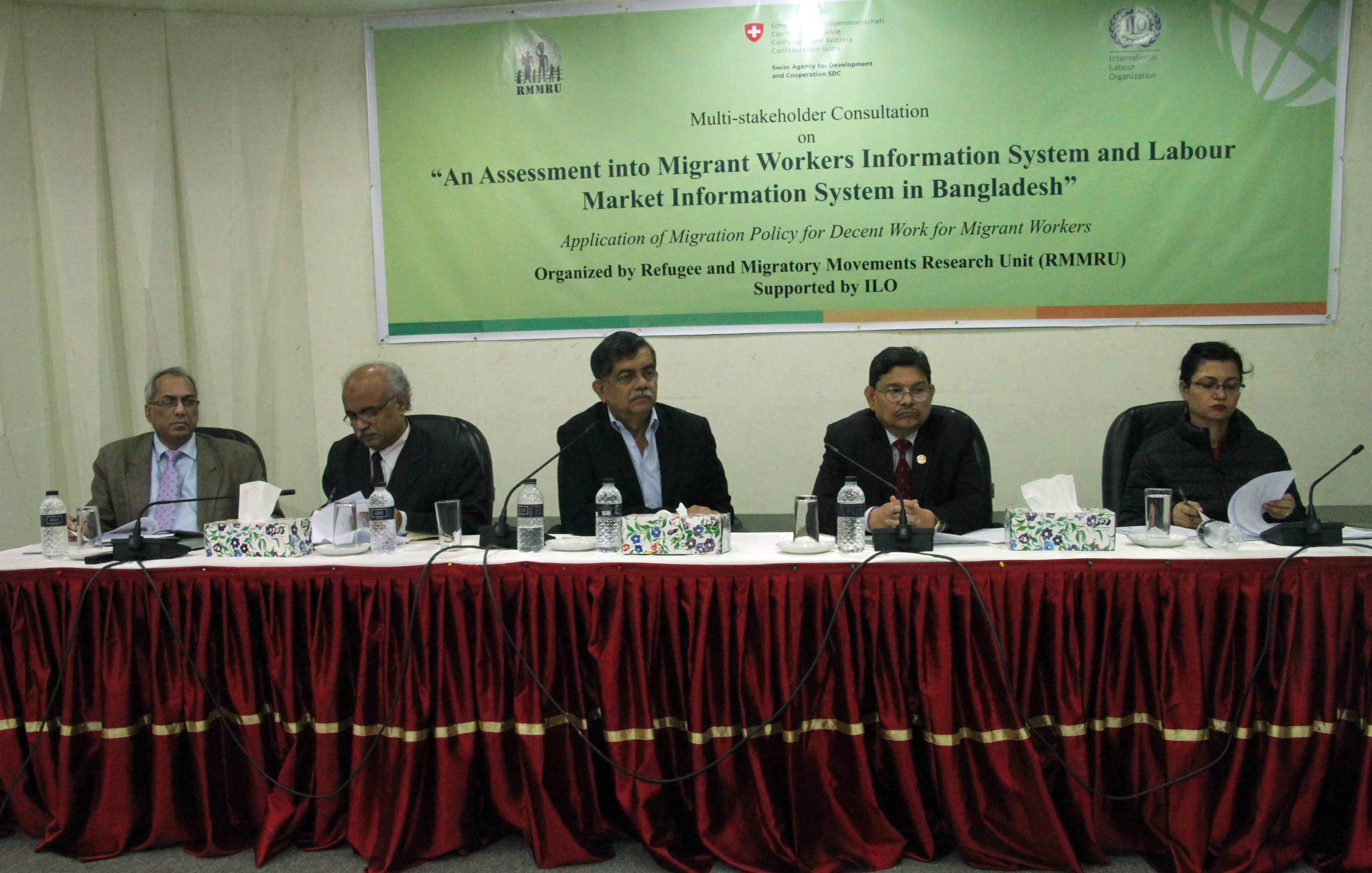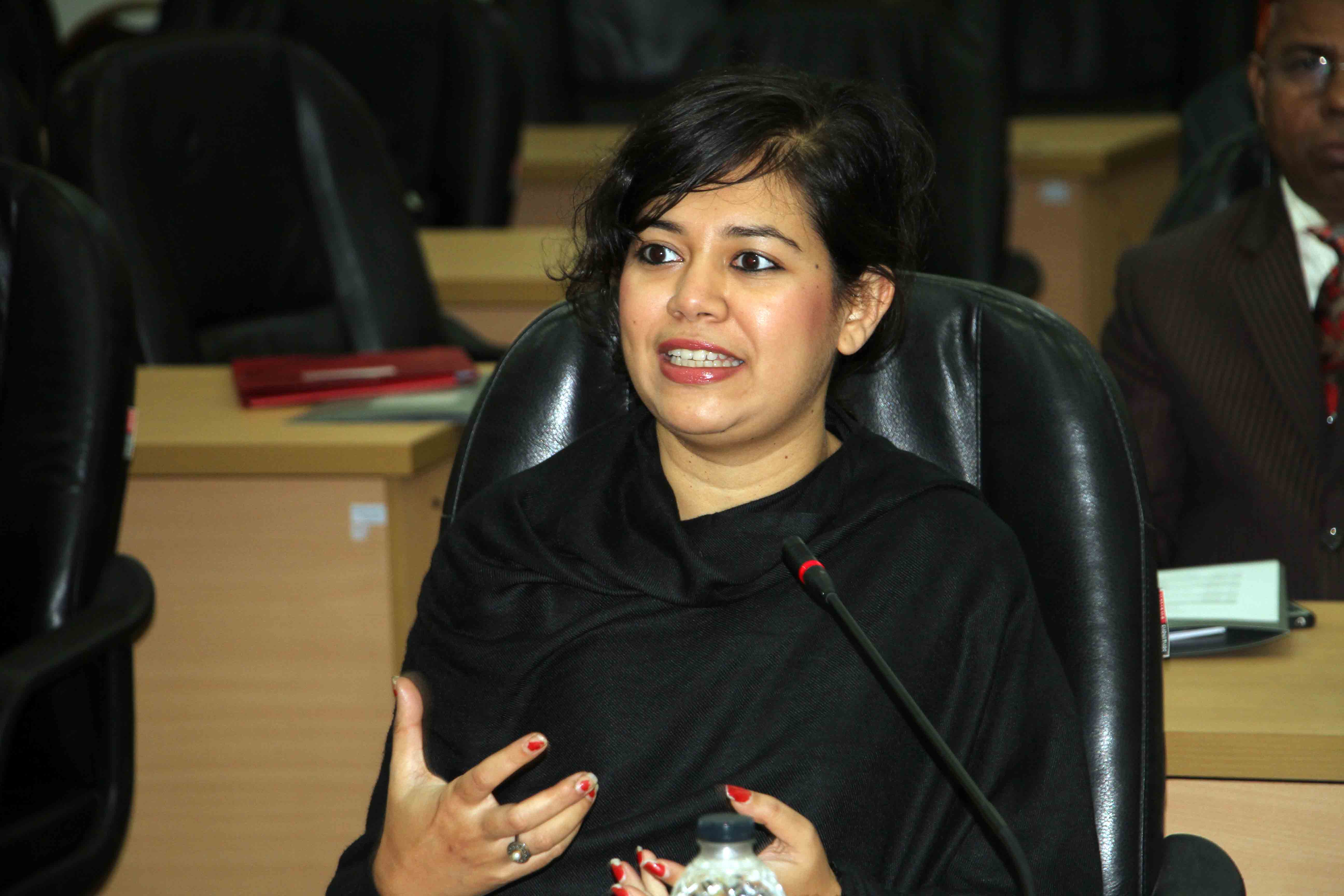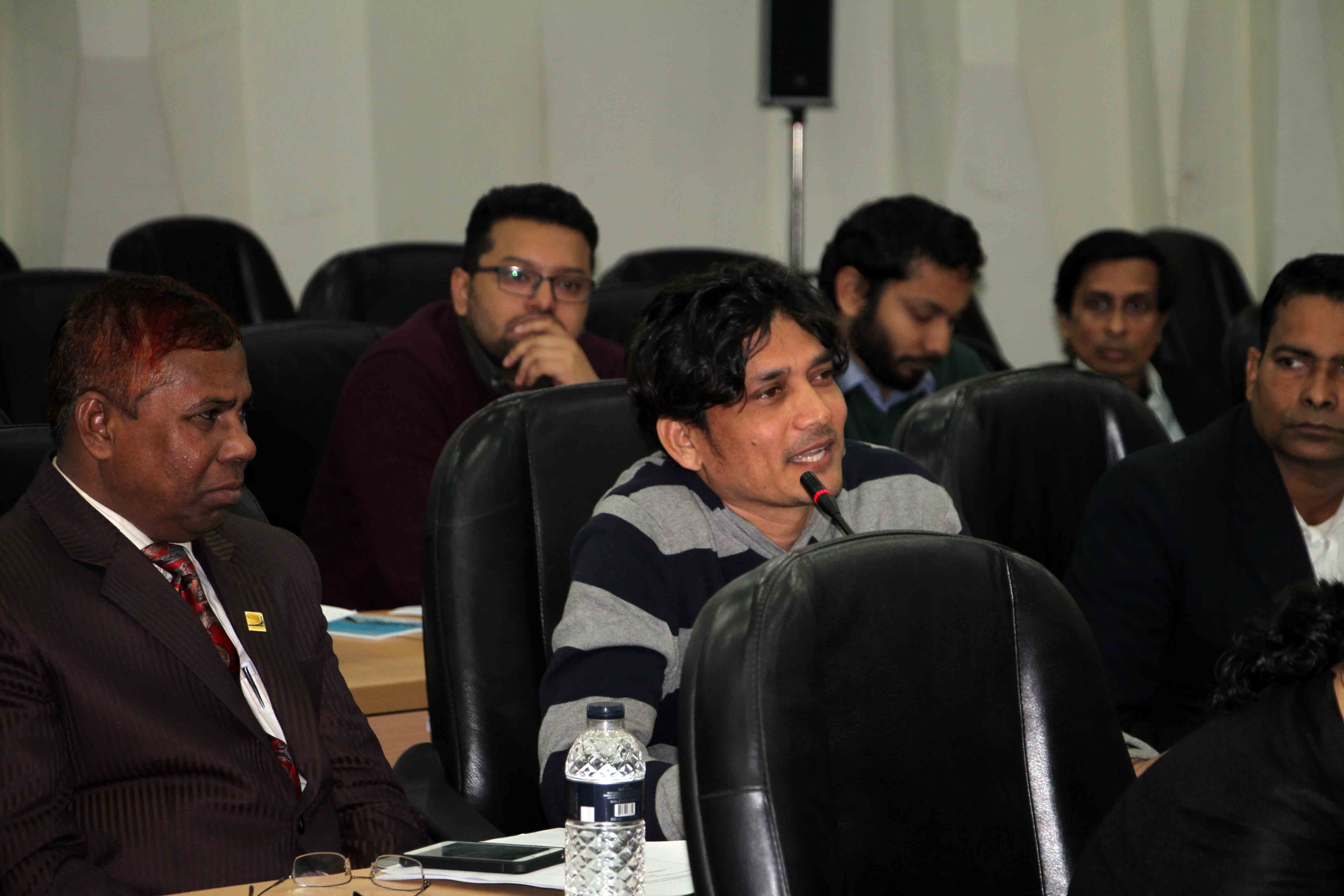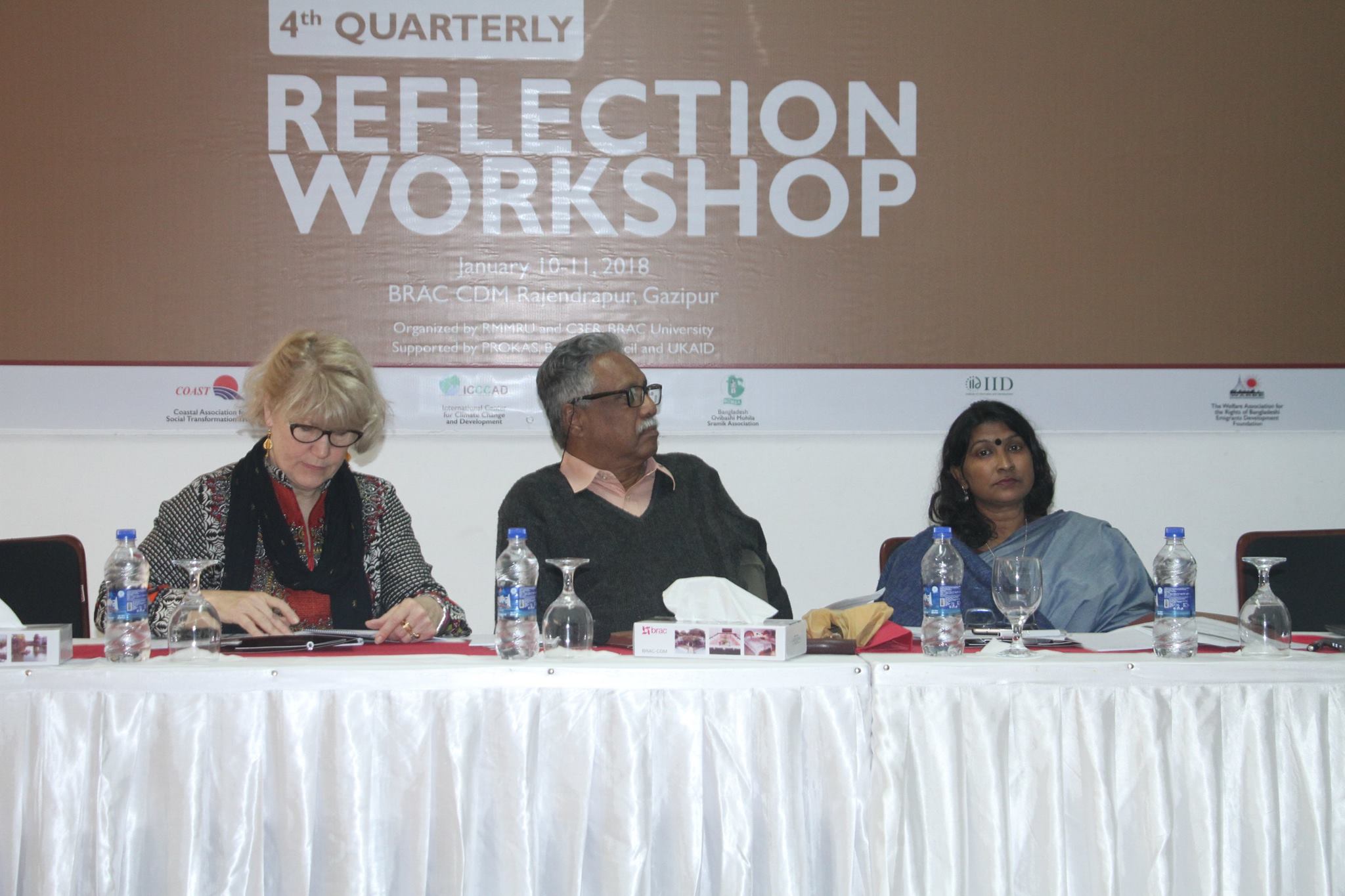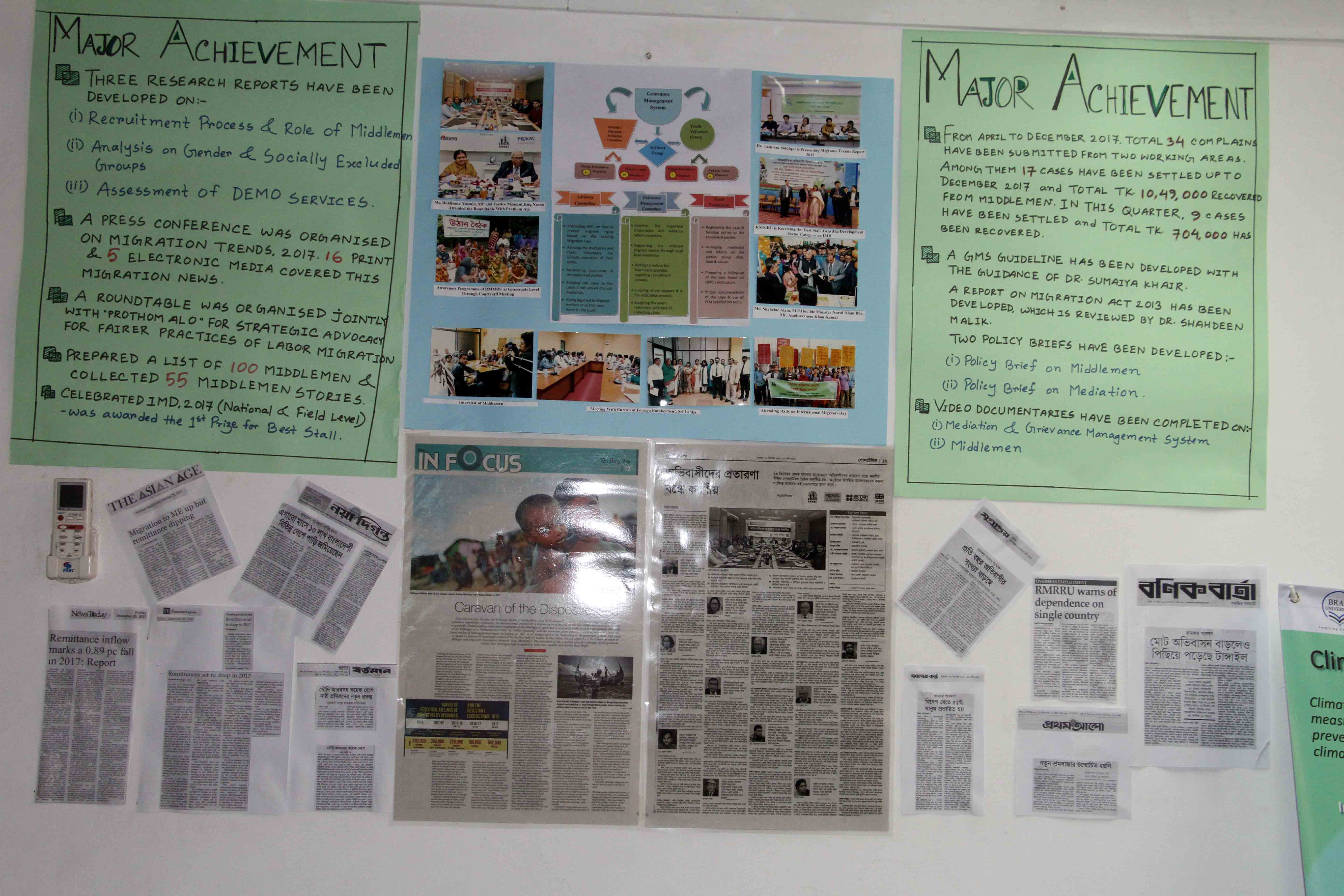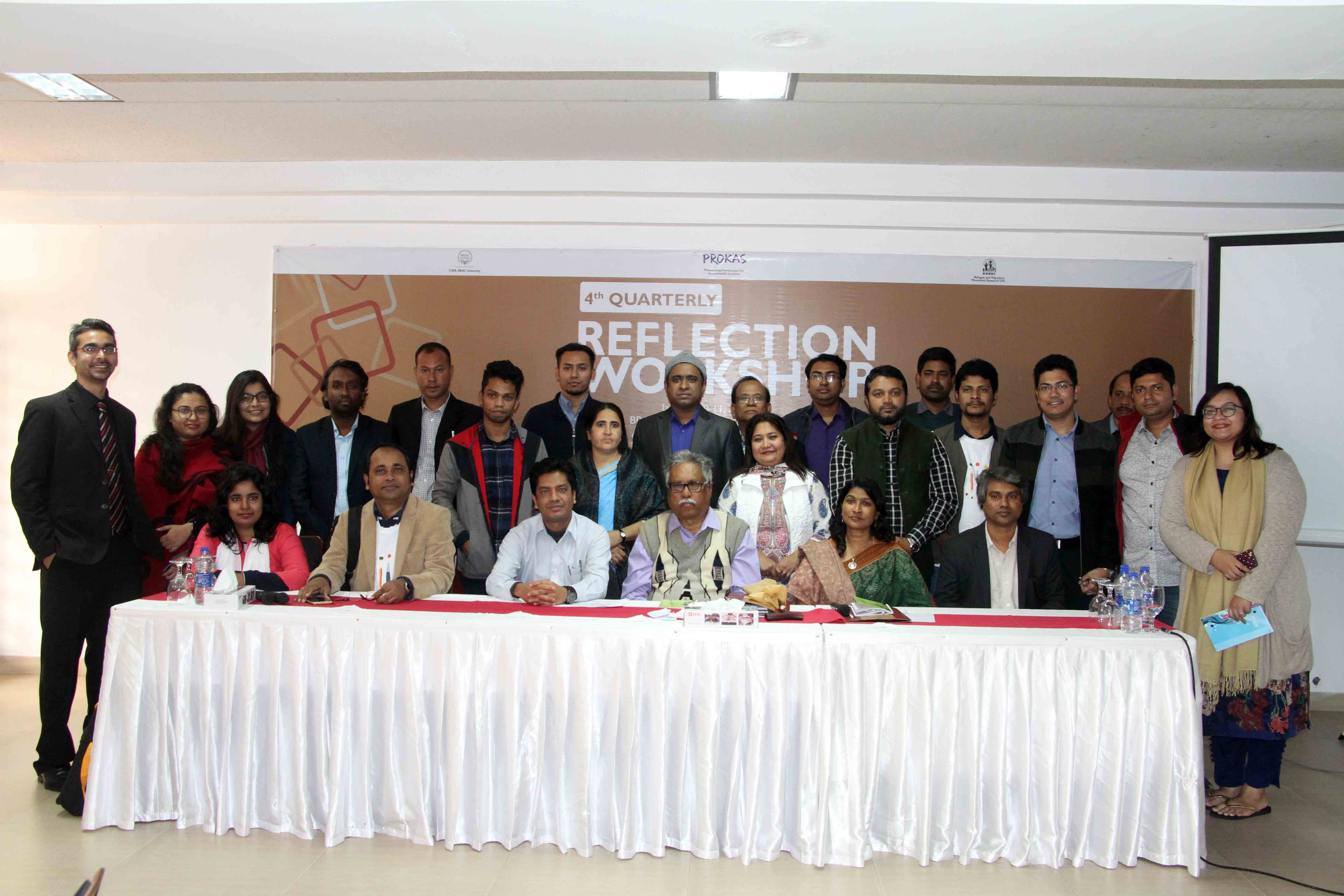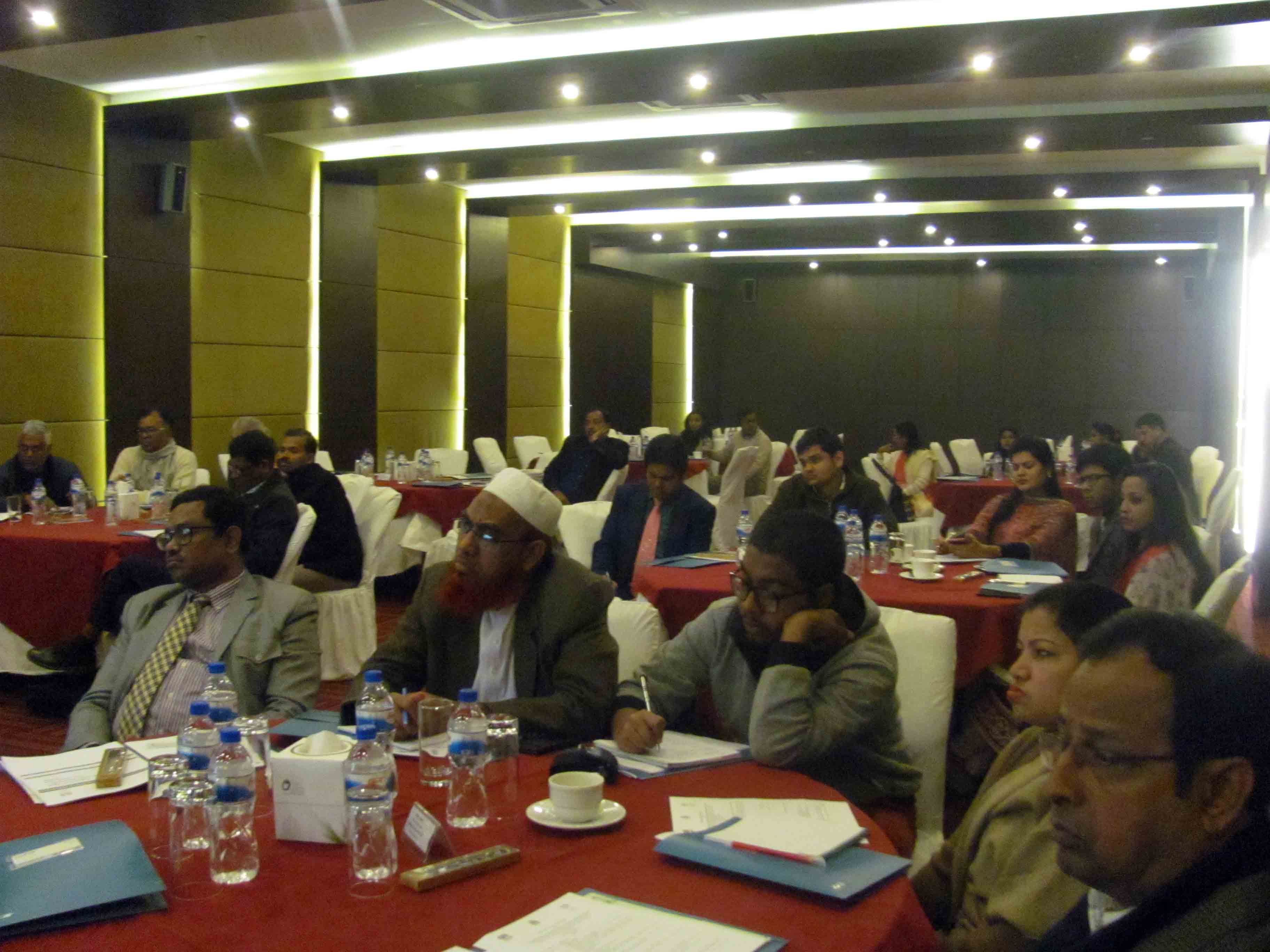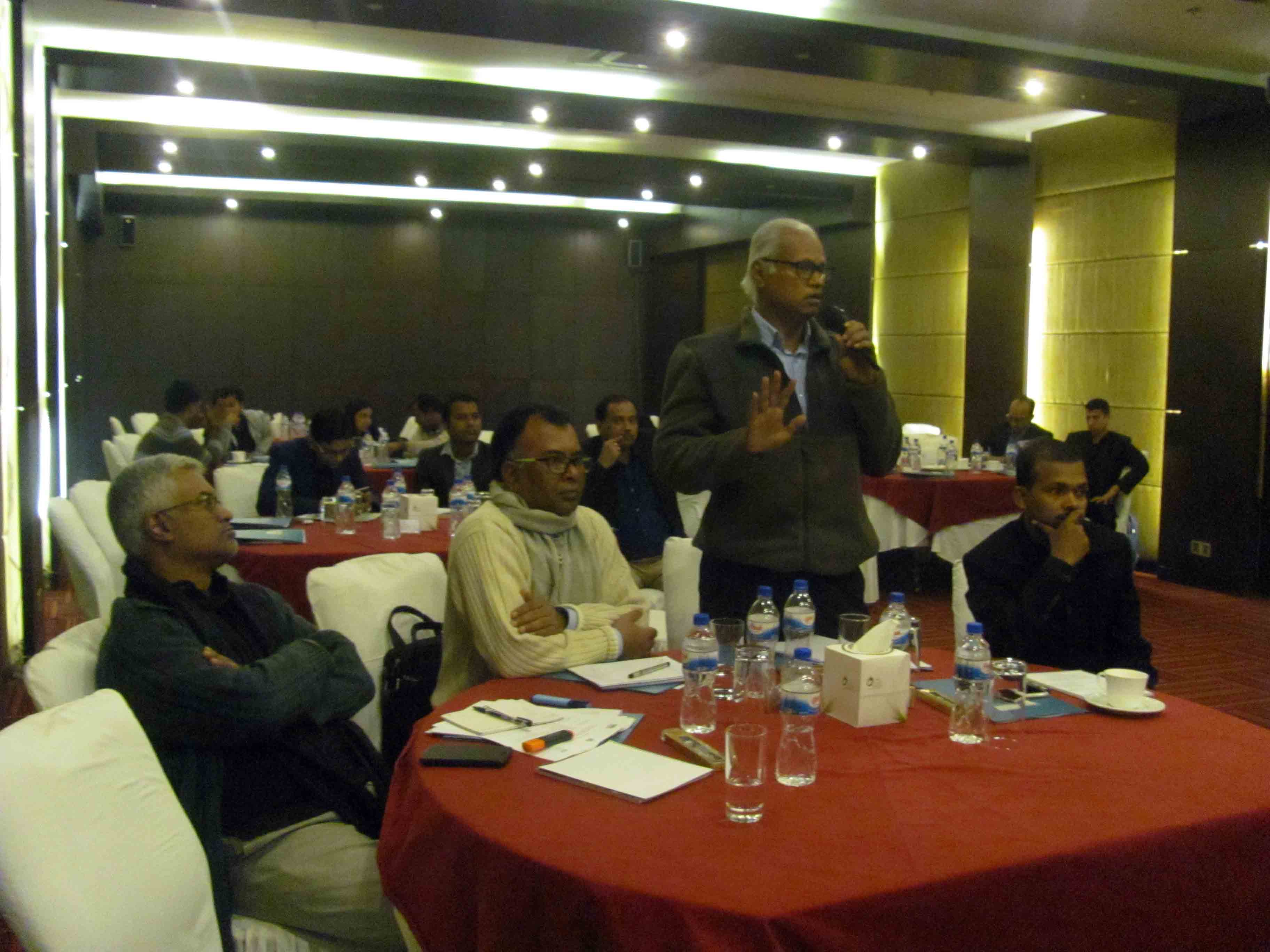Organized by: Refugee and Migratory Movements Research Unit (RMMRU)
Date: Wednesday, 23 December 2018
Venue: VIP Lounge, National Press Club, Dhaka
Supported by: Fairer Labour Migration (FLM) Project / British Council
Venue: Well Park Residence Boutique Hotel and Suits
Date: 23 November 2018
Organized by: RMMRU and University of Exeter
Funded by: Economic Social Research Council and DFID
Venue: BRAC Centre Inn
Date: 30 October 2018
Organized by RMMRU
Funded by: Swiss Agency for Development and Cooperation (SDC)
Book Launching and Handover Programme of Migration Mediation Publications
Venue: BMET Conference Room, Dhaka
Date: 25th October 2018
Jointly organized by RMMRU and BMET
In this programme, Mr. Salim Reza, DG, BMET and Chair of the programme said that
BMET works to resolve many crucial problems through arbitration at the people’s doorsteps.RMMRU also exercise a mediation process in community level which I found very effective and I like to replicate the model, developed by RMMRU and applying in the field. I like to request RMMRU for organizing capacity development training for DEMO officers to ensure effective arbitration process to get solid output by means of recovering money. I thought that the book would play an important role in resolving migrant problems in mediation at the doorsteps.
Date: 23 September 2018
Venue: Ascott the Residence
Dr. Saleemul Haque, Director, ICCAAD said that:
Climate migration we are seeing today may or may not be climate migration unless we have very good evidence to show that it is because of climate change. He expected to utilize all sorts of personal and networking to formally present the draft to the government that has been done with vital contribution from RMMRU. RMMRU already has worked on it to make a policy on internally displace migrants because of climate change from Bangladesh with the help of Bangladesh government and Ministry of Disaster Management and Relief (MoDMR). But this work does not run because of changing of related people of government office. It is the right time to push government regarding the issue for future using sources of contact, network because it is an important topic. He also acknowledged the nice work of RMMRU as a PROKAS partner and hoped to work through collaboration with RMMRU and PROKAS other partners on the issue.
Dr. Ainun Nishat, Advisor, BRAC University said that:
If we think about the displacement of climate vulnerable people, we have to go forward following the future projection of climate change. We have to be careful about the projection which timeline we are going to reach. We need to focus on adaptation due to climate change. Riverbank erosion should a prime concern in permanent displacement and some functional solution.
Date: 25 and 26 September 2018
Venue: Proshoshik Porshod, Tangail
Mr. Kartik Chandra Debnath, AD, DEMO, Tangail acknowledged the activities of RMMRU and said DEMO is always ready to provide services to migrants at a community level. He pointed that DEMO, TTC, and RMMRU all are working together actively to ensure the access of services to migrant’s community and provide information to community people of safe migration.
Date: 9 August 2018
Venue: BURO Bangladesh Training Centre
RMMRU is piloting the community Group for Migration Services( CGMS) at two unions on Tangail Sadar, Tangail. The aim of formation of these two groups are ensuring the access of services in a faster way, reducing the risk of fraudulence, supporting decentralization services of government and connecting community people with BMET, DEMO, TTC etc. It will be a platform to build up network among grassroots people and government. For enhance their capacity RMMRU organized an orientation programme for Community Group for Migration Services on 9 August 2018 at BURO Bangladesh Training Centre. Marina Sultana Director Programme, RMMRU moderated the training. She introduces RMMRU briefly including its policy, contribution and objectives etc. The participants of the training were 26 members of CGMS from two working areas of Tangail. Among them 6 members were women rest were male members.
Objective of the Orientation
• Building Capacity of Community Group for Migration Services (CGMS) Members and develop their knowledge in migration sector
• Providing information about safe migration and migration services provided by the government for migrants and their family members
Major areas covered in the orientation
• Basic information of migration and steps of safe migration
• Practicing the services of DEMO, TTC, WEWF etc through role play
• Learning of the process of mediation by RMMC
• Sharing CGMS formation guideline
• Identifying roles and responsibilities of CGMS
• Risk and risk mitigation strategy through group work
• Action plan for CGMS
8 August 2018
BURO Bangladesh Training Centre
“RMMRU is playing active role to ensure migrants rights to develop migration sector that is really appreciable. We will work together to ensure safe migration “
Mr. Kartik Chandra Debnath, AD, DEMO, Tangail appreciated the consultation for connecting the community people and government. He pointed that DEMO, TTC and RMMRU all are working together actively to ensure the access of services to migrant’s community and provide information to community people of safe migration.
Mr. Kamrujjaman, Principal, TTC pointed out the importance of TTC. He stated that we need more skill manpower to acquire more remittances. He also said “our collective action will promote good governance in migration Sector. I am personally thankful to RMMRU for playing major contributing role in this sector and supporting government to disseminate information and encouraging decentralization process of government by forming such committees in grassroots level who will connect community people to government and vice versa."
Mr. Golam Ahad, District Information Officer encouraged the committee members to serve the migrants and their families voluntarily and said that
“if they come to this committee they will show the proper way of migration and link them with us. If people do not to take service from us we cannot reach them or force them to take service. As they get help from middleman they bound to rely on them. I wish this new initiative of RMMRU will address the gap between community people and government office.”
Venue: CIRDAP Auditorium, Dhaka
Date: 29-30 July 2018
Jointly Organized by BCSM and MFA
Opening session of this consultation is moderated by Ms Marina Sultana, Director, Programme, RMMRU. Mr. Syed Saiful Haque, Co Chair, Bangladesh Civil Society for Migration (BCSM) and Ms. Alexis Nadine Bautista , Migrant Forum in Asia provided the welcome remarks. The Chief Guest was Ms. Hosne Ara Lutfa Dalia, MP, Co-Chair, Bangladesh Parliamentary Caucus on Migration and Development. In plenary session Ms. Jasiya Khatun, Director, WARBE, provided presentation on Global Compact for Safe, Orderly and Regular Migration, Migration and 2030 Agenda for Sustainable Development by Mr. Shakirul Islam, Chairman, OKUP and Different national processes around implementation of GCM by Ms. Sarowat Binte Islam, Senior Programme Manager, MJF. The most important part of first day consultation was issue based group work to set recommendations and BCSM National Strategy on the Implementation of the GCM.
On the second and final day Ms. Rahnuma Salam Khan, National programme Officer, International Labour Organization (ILO), Dhaka Ms. Nazia Haider, Programme Manager – Safer Migration, Swiss Agency for Development and Cooperation (SDC), Dhaka and Ms. Pravina Gurung, Project Support Officer, International Organization for Migration (IOM), Dhaka presented on Development partners initiatives on implementation of GCM in Bangladesh. Giorgi Gigauri, IOM Chief of Mission in Bangladesh presented in the programme as special guest
Dr. Md. Nurul Islam, Director, BMET was present as the special guest and suggested to form a committee like the SGD committee for CGM. He said that “In most cases we see that the migrants don’t say about the extra money that they pay to migrate but disclose when they fall in fraudulence. So, there is no alternative of awareness building of the migrants” Speaking as the Chief Guest Mr. Shahidul Haque, Honourable Secretary, Ministry of Foreign Affairs stated that “Civil society may play a vital role to ensure justice, rights and good governance in migration sector. Now it is a golden opportunity for IOM to play part in GCM like UNHCR does for the refugees. He said about the one review forum (not two) should be formed. He added that the destination countries always tend to be in the benefited side. So, it is needed to make international laws or to create pressure on them to make it fruitful”. Overall, the consultation was filled with 52 participants representing BCSM and all relevant stakeholders in migration sector in Bangladesh. They contributed to generating a constructive dialogue on the implementation of GCM in the context of Bangladesh and set out to have a pragmatic global governance framework to address large movements of migrants and refugees across the globe, including Bangladesh.
Venue: International Conference Center (1st Floor), CIRDAP
Event Date: 31st March 2018
Organized by: Refugee Migratory Movement Research Unit (RMMRU)
Supported by: WIF Project, International Labour Organization (ILO)
The Refugee and Migratory Movements Research Unit (RMMRU) has organized the National Dialogue with High Level Government Officials on Policies Addressing Labour and Mobility. Ms. Marina Sultana, Director, Programme, RMMRU, moderated the Dialogue. Mr. Md. Nazrul Islam, Full Time Member, National Human Rights Commission Bangladesh was present as Chief Guest. Additional Secretary of the Ministry of Social Welfare Mr. Rupan Kanti Shil addressed the function as the special guest.
Speaking as the Chief Guest NHRC Fulltime Member Mr. Md. Nazrul Islam said that underpinned the need for conducting in-depth research by the government on migration to find out the challenges, opportunities and markets for the country's manpower sector.
He also emphasized on supplying skilled manpower on the basis of demand of a particular labour markets. He urged the people to avail of the advantage of the Right to Information (RTI) Act-2009 to know the process of migration with overseas jobs for avoiding fraudulences by middlemen.
Lawyer Jyotirmoy Barua lamented that a large number of bodies of migrant workers were being received every year, but the actual causes of their deaths were usually not known. He sought intervention of international organizations in this connection.
Former Secretary General of the Bangladesh Association of International Recruiting Agencies Ali Haider Chowdhury said that the demand-based skills training should be introduced for women overseas jobseekers.’ Professions like care giving and nursing have a huge demand in different countries where the number of aged people is growing day by day,’ he said adding that Bangladesh should target such jobs for Bangladeshi women migrants.
Ali Haider suggested that the Bangladesh government might focus on developing a dormitory system for domestic helps as the housemaids were more vulnerable to abuses in employers’ houses.
Overall, the dialogue was filled with 50 participants representing all possible stakeholders relating to women and migration of Bangladesh. There had been civil society members who discussed over the topic in normative sense, there was NGO workers who are working on policies addressing Labour and Mobility, even government representative who are committed to safeguard the security of female migrant workers of Bangladesh. Conclusively, the dialogue was successful to engage all possible stakeholders and to omit the gap between knowledge on policies addressing Labour and Mobility.
Venue: BMET Conference Room
Date: 11 March 2018
Jointly Organized by RMMRU and BMET
Refugee and Migratory Movements Research Unit (RMMRU) organized a joint workshop with BMET named “Workshop of Learning of Arbitration/ Mediation and Migration Services” held on 11 March 2018 at BMET Conference Room for sharing the process of mediation and mediation document to BMET. This was an initiative of sharing experiences of arbitration process of BMET as well as mediation system of RMMRU at the grassroots level to ensure application of the Migration Act, 2013. This programme was chaired by DR. Sumaiya Khair, chair of RMMRU Officials of Arbitration section of BMET and Ministry of MoEWOE were present there as participants. Director of employment, Mr. Ataur Rahman, Director training Mr. Nurul Islam and Mr. Atiur Rahaman, Director Immigration attended the programme as panel discussant. Dr. Jamila A. Chowdhury, Associate Professor, Department of Law, University of Dhaka shared about alternative dispute regulation and Mr. Masud Rana, Senior Statistics officer, BMET presented on Arbitration system of BMET.
RMMRU showed the documentary on how RMMRU settles migration related disputes through mediation using the Grievance Management System. The video described the process of how the committees work from their respective positions in order to constitute mediation, the process of mediation, amicable solutions taken by the committee etc.
The most important part of this programme was sharing of RMMRU’s Migration Manual titled “Migration Disputes Mediation Manual” with BMET directors and officials. The process of the mediation which is conducted by the GMS is highlighted in the manual with step by step with instruction.
Dr. Jamila A. Chowdhury presented the importance of ADR in Migration sector, skills, and techniques to be followed by a mediator.
Ms. Marina Sultana presented how RMMRU Practices migration Mediation at the grassroots level. She focused on ‘Three Stages’ of Migration.
Dr. Sumiay Khair summarizes the mode of operation of the Grievance Management System on how it works regarding the mediation.
Dr. Sumaiya Khair, chair of this programme said that “Mediation is informal case management. It is accepted by the people historically as like an as formal case. Mediation and Arbitration are different. Mediation is conducted where mediator facilities the mediation and helps parties to take their own decision. On the other hand, arbitration is the process where the third party decides what will be the decision and parties must have to accept the decision of the mediation.”
Dr. Nurul Islam, Director Training Operation, BMET said that “Mediation is widely accepted the process of ADR. RMMRU has taken this kind of initiative which is very much helpful to settle the case of migration fraudulence.” He also said that as most of the cases victim does have the proper documents so it becomes difficult to redress through formal case management.
RMRMU practices mediation where the mediator practices win-win situation and both parties become satisfied with the decision. RMMRU maintains documents of mediation filing up different forms to make an institutionalized process of mediation.
Venue: BMET Conference Room
Date: 19th February 2018
Organized by: Refugee Migratory Movement Research Unit (RMMRU)
Supported by: WIF Project, International Labour Organization (ILO)
Speaking as the Chief Guest BMET Director General Mr. Salim Reza called it a success for the government that it could make female workers’ migration free of cost.
Dialogue moderator and Executive Director of RMMRU Dr. C R Abrar said that the migrant workers seldom get their legitimate arrears wages. Dr. C R Abrar, also said that the state-owned BTV should run campaigns to keep the migrant workers informed about the real picture about migration.
Supreme Court Lawyer Jyotirmoy Barua stressed the need for proper enforcement of the Overseas Employment and Migration Act 2013.
Labour leader Rokonuzzaman Ratan said that the government could create a fund with remittance money to assist deprived and abused migrant workers.
Manusher Jonno Foundation Program Manager Ms. Sarwat Binte Islam asked the authorities to find out alternative job markets for female workers and stop sending them to the KSA from where many women workers returned home as victims of sexual abuse and non- payment of wages.
Overall, the Dialogue was filled with 50 participants representing all possible stakeholders relating to women and migration of Bangladesh. There had been civil society members who discussed over the topic in the normative sense, there were NGO workers who are working to promote Migration Governance of Women Mobility, Employment, and Access to Entitlements, even government representative who are committed to safeguarding the security of female migrant workers of Bangladesh. Conclusively, the Dialogue was successful to engage all possible stakeholders and to omit the gap between knowledge of Migration Governance of Women Mobility and practical situation happening around.
Venue: Poshoshik Porshod Hall Room
Date: 10 February 2017
Organized by RMMRU
Supported by PROKAS, British Council
The Training was divided on three sessions highlighted on
• Mediation
• Migration Act 2013
• Migration Services for Safe Migration
In the session on safe migration and migration services, participants became aware of the process of migration through the Video documentary named “Jatra “ of RMMRU. Ms Marina Sultana, Director Programme showed the services of migration provided by BMET, Ministry of Expatriates' Welfare & Overseas Employment, Pobashi Kollayan Bank, Wage Earners’ Welfare Board, BAIRA, BOESL, RMMRU and other services through their websites after completing group work on migration services on group work. On Mediation Session, participants participated in role play of mediation where lawyer provided their opinion on mediation. And in the final session three lawyers read out the migration act 2013 taking all participants in three group work. Assistant Commissioner presented the migration act 2013 and mediation. Representative from RMMRU reflected the process the mediation according to Migration Mediation Module of RMMRU
Major Findings of the Training
• Mediation on migration fraudulence is accepted and appraised by the local people by the grassroots people even by the middleman
• Middleman is becoming concern about their activities as they are becoming accountable by this mediation process
• The involvement of National Legal Aid Services with RMMRU for reducing fraudulence through Mediation made a positive response among the grassroots people and mediators are becoming more confident about their work
• Lawyers praised the role of mediator and youth volunteer group for conducting mediation through proper way and following the steps of mediation
Venue: CIRDAP
Date: 31 January 2018
Organized by RMMRU
Funded by Swiss Agency for Development and Cooperation (SDC)
Organized by: RMMRU
Supported by: ILO
Venue: CIRDAP auditorium
Date: 29 January 2018
The validation workshop was arranged under the project: An Assessment into Migrant Workers Information System and Labour Market Information System in Bangladesh, supported by ILO. The consultation was chaired by Dr. C R Abrar, Executive Director, RMMRU. Mr. Md. Nazrul Islam, Member, Human Rights Commission (NHRC) was present as the Chief Guest of the program.
After the welcome note by Dr. C R Abrar and address by Ms. Rahnuma Salam Khan, National Program Officer of ILO, study presentations were held by Mr. S N Azad, Senior Fellow, RMMRU. The first presentation was held on Data Gaps and Needs Study which mainly focus on the analysis the gap in data for a better understanding of the relevance and impact of any data gaps identified. The presentation was discovered data that are available, their strengths and limitations and what data are regarded as important but not available to answer essential development questions. After the presentation, the session supported discussions within and across agencies, organizations and communities on how to bridge data gaps and sustain data assets.
The second presentation was presented by Md. Mazharul Islam, System Analyst, Daffodil IT and Team Member, MIS Data Integration Project, RMMRU. This presentation highlighted Data Integration Design of the project aimed at ensuring the most accurate collection of migrants and labor market information in a place which will help the government (and other migrants related stakeholders to help government) to make a better development policy according to the analysis and manage the migrants related tasks digitally.
Other representatives from BRAC, DEMO, WEWB, IOM, Dnet, BEF, Daffodil IT, CPD, ASK, WARBE, and Dhaka University also attended the program. Overall, active participation by the representatives made the consolation very informative and productive.
Organized by: RMMRU
Supported by: ILO
Venue: CIRDAP
Date: 17 January 2018
Other representatives from A2i, BGTTC, BRAC, World Bank, DEMO, IOM, SDC, Dnet, DYD, BEF, WARBE, BOMSA, YPSA, Daffodil IT, CPD, OKUP, ASK, Dhaka University, and Awaj Foundation also attended the program.
The meeting started with welcome note and presentations. After that, representatives from different organizations actively participated in discussion. The first presentation was presented the comparability analysis of internal system with overseas database system in Sri-Lanka and Nepal. The next presentation focused on field survey and key findings from the survey. After both presentations, an active discussion was held and very significant comment and recommendation were come from the discussion.
Date: 9-11 January 2018
Venue: BRAC-CDM, Gazipur
Organised by: RMMRU
Supported by: PROKAS
Hosne Ara Lutfa Dalia, MP, Member of Parliamentary CAUCAS and Dr Atiq Rahman, Executive Director of BCAS presented as the guest of the programme.
The participant of the programme consists of 65 members from Climate Finance Transparency Mechanism (CFTM) project and the Fairer Labour Migration (FLM) Project. CFTM is being implemented by a Consortium of five organizations, consists of Bangladesh Centre for Advanced Studies (BCAS), Centre for Climate Change and Environmental Research (C3ER), COAST Trust, Campaign for Sustainable Rural Livelihoods (CSRL) and International Centre for Climate Change and Development (ICCCAD). Whereas, the FLM consortium consists of Institute of Informatics and Development (IID), Young Power in Social Action (YPSA), WARBE Development Foundation, Bangladesh Ovhibashi Mohila Sramik Association (BOMSA), and Refugee and Migratory Movements Research Unit (RMMRU). In this programme all IBP partners shared their achievements of last quarter. Experts from Migration sector and Climate provide their opinion.
Hosne Ara Lutfa Dalia, MP explained that “Most of the local people try to hide the matter of migration so in this case the assistance of local chairman, member or women member is required. She stated “each layer of local government should be utilized properly. As the local people trust the local people more, the local representatives should be given some sort of powers.”
Ms. Catherine Cecile She stated that “All of the IBP partners whether related to labour migration or climate governance have undertaken a bridge of innovative efforts to focus on gender equality and social exclusion. In one side Labour Migration Governance have placed their focus on the middlemen issue in migration processing and developed various mechanisms to address this matter on national level. On the other side took the opportunity to influence global actors and shake global conversation while showcasing the climate plural”
Dr. Ainun Nishat said that “Train the labour migrants for specific jobs like- caretakers, cultural education, taking care of environment will help them to find job abroad easily.”
Venue: The Olives Hotel
Event Date: 9th January 2018
Organized by: RMMRU in Association with WIF Project, International Labor Organization (ILO)
The Refugee and Migratory Movements Research Unit (RMMRU) has organized the National Advocacy Workshop on Fair and Ethical Recruitment Practice of Female Migrant Worker in collaboration with the International Labor Organization (ILO). Ms. Marina Sultana, Director, Program, RMMRU, moderated the workshop. The opening session was chaired by Dr. A.S.M Ali Ashraf, Adjunct Research Fellow RMMRU. Mr. Md. Nazrul Islam, Full time Member, National Human Rights Commission Bangladesh was present as chief guest.
Major Contents of the Workshop:
Present Scenario of Recruitment Practice and Legal Framework to Solve Problem: Dr. A.S.M Ali Ashraf has tried to throw light on the issue of how recruitment system works in Bangladesh at present time. He has pointed out some major problem regarding fair recruitment; female migrant workers are still paying subagents to facilitate their migration process when officially they do not need to pay money to the agents or subagents, sometimes female migrants are trafficked. Dr. Ashraf has also pointed out some normative approach to ensure that female migrant workers are recruited ethically. For example, he mentioned the Prevention and Suppression of Human Trafficking Act 2012 and Overseas Employment and Migration Act 2013. He urged to deal with fraudulent cases under the 2013 act and asked to promote awareness on the issue of fair and ethical recruitment at the grass root level.
Unethical Recruitment: Practical Experience Sharing: Bithi Akhtar was a returnee migrant who had worked in Saudi Arabia in 2017 was present in the workshop to share her real life experiences in abroad as a domestic worker. She is originally from Khulna, happily married and has two children (one 3 years old another recently died). Insufficient economic condition compelled her to opt for migration in Saudi Arabia. She paid 25000 BDT to a subagent who managed her to migrate. She took six months training in housekeeping and was recruited in a Mega Company in Saudi Arabia. Her agent told that she will get at least 25000 BDT per month salary but when she migrated she was offered no salary for the first 6 months. After first half of a year when she asked her Kafil (recruiting company in Saudi Arabia) to pay money she was sold another house for 2 months. When she demanded her salary, she was again sold at another house. She told that she was physically tortured three times and fall trap of sexual harassment once. Even she was not allowed to talk to her family.
Expert Opinion 1: Mr. Shameem Ahmed Chowdhury Noman-Representative BAIRA: Mr. Noman have pointed out that Bithi Akhtar was actually not sold, as she was recruited under a Mega Company, she was sent to work for house on contact basis. He was regretful that she was not paid and was not notified at her child death. He maintained impartiality in his comment on the issue and told that we can only send migrants but are not liable to take the responsibility to provide safety and security of their life. Government is actually responsible to take the charge to secure migrants life, but in his perception government is also unable to take that charge because reduced level of manpower to safeguard each migrants’ life. Mr. Noman is empathetic that migrants are still suffering but he told he is unable to provide absolute security to the migrants with limited government intervention. Mr. Noman recommended some ways Bangladesh government can follow; Indonesian model of sending migrants to ensure ethical and fair recruitment, sending more labor attaché in the host courtiers, bilateral negotiation, and search for alternative international labor market, help migrants to take mental and physical preparation. He specifically pointed some steps to taken to solve existing problem, as;
I. Improving training quality for the female migrant workers.
II. Increase training duration from 1 month to 6 months.
III. Language problem should seriously be solved.
IV. Making strong relationship between recruiting agencies with government agencies.
V. Ensuring Migrants are taking their SMART-Card.
VI. Search for alternative labor market.
Expert Opinion 2: Rafiqul Islam Khan Alam-Policy Analyst at INCIDIN Bangladesh: Mr. Alam pointed out that the gap of discussion on the issue of fair and ethical recruitment practice of female migrant workers is making the situation more vulnerable to apprehend. Being pessimistic, he showed his concern for those who are still working in Arab States and for those who are tending to go there for working. In his perception Islamic Principals are virtually dominating the Arab culture but in reality they are even now way more barbarous as they had been 1400 years ago. They take domestic worker as their slaves and think they have their right to abuse sexually, physically or even in ways beyond our imagination. He is also concern for those migrants who earn money at the cost of dignity. Mr. Alam share his experience of talking to a female migrant working in Jordan that particular migrant was rapped gradually and consecutively by 7 male members of the host family. Mr. Alam was happy to share some of his concerning to the stakeholder present at the workshop;
I. We should ensure our dignity first, otherwise we will lose our identity.
II. Safe, secure and dignified work, otherwise stop migration.
III. Returnee migrants should be offered with added rehabilitation facilities.
Extended Load and Low Payment: Experience Shared by Jahida Begum: Miss Jahida Begum was one of those returnee migrants who were allured by subagents (DALAL) to migrate in Oman at the expense of 20000 BDT. Firs time she did not took any formal training of housekeeping nor had her contact paper prior to take flight for Amman. She stayed there for 1 year but she was not offered her promised salary. Dalal said she will get 20000 BDT but she got only 12000 BDT. Now she is intending to migrate in Saudi Arabia with a formal training from Bangladesh Korea Technical Training Center (BKTTC). This time she wants to migrate in Saudi because in that very country she can get salary of about 20000 BDT.
Expert Comment 1: Ms. Rokeya Rafeque Executive Director, Kormojibi Nari: Migration is like the golden deer, we should never say no to migration because the way migration helped our economy is appreciable and praiseworthy, and this typical narrative was marked by the voice of Miss Rafaque. She recognized the short comings of migration but she exposed that every profession has it respective challenges; we better address the challenges to make it smooth. She said those who said women are not safe abroad; do they have any reason to explain how far women are safe in Bangladesh? Economic as well as family need actually enforcing women to expatriate, can you exemplify someone with economic sufficiency migrate? She encouraged organizing informed migration so that the migrants are aware of their upcoming challenges and can meet the challenges with courage and confidence. He reiterated the importance of migration to sustain economic independence of Bangladesh at the same time to empower women respectively. Miss. Rafeque advised the concerning authority to advertise safe, secure and informed migration.
v Expert Comment: Tapati Saha from UN Women: UN can ensure that women working in Saudi Arabia could get the dignity prescribed by the UN law. Because Most of the Arabian states are not the signatory of UN Labor Law Charter nor even a signatory of UN Women Convention. Still, we need to work in those countries to promote women’s right. She has recommended some points as;
I. Civil society based monitoring in the host country.
II. Community initiative to solve domestic violence against migrant workers
III. We need to upgrade the professional training for migrating women.
Expert Comment: Asif Munier, Independent Consultant: Mr. Munier pointed some notes for women empowerment as (i) life skills (ii) training (iii) monitoring by the govt. and (iv) interactive tools of teaching. Being pessimistic he said ILO labor laws are only an idealistic tool which is groundless in many respect. We should regular FNF VISA to make fraudulence cases reduced. He recommended the present stakeholders to be realistic and to be specific to solve problems practically.
Remark by the Guest of Honor: Mr. Gagan Rajbhandari Deputy Director and Officer in Charge, ILO, Country office for Bangladesh: Mr. Rajbhandari said that labor migration is challenging and the challenges are big in size but we need to address these challenges in such a way that can result in the extensive flow of labor migration in all over the world. People want information, and if potential migrants are endowed with all possible information they can save themselves from all possible harassments and maltreatment.
Remarks by the Chief Guest: Md. Nazrul Islam, Full Time Member, National Human Rights Commission Bangladesh: Mr. Nazrul is a bit normative in his speech. He mentioned some steps as;
I. There should be a committee on migrants’ worker’s rights especially for female migrants.
II. Advertisement can help fair and ethical recruitments.
III. Need improvement in training.
IV. Need to observe training quality
V. Training must be digitized as well as the recruitment process
VI. Home Ministry, Foreign Ministry and Human Rights commission should work hand in hand.
VII. There must be a committee of civil society who will observe the work.
VIII. Search for alternative jobs and job market is recommended.
